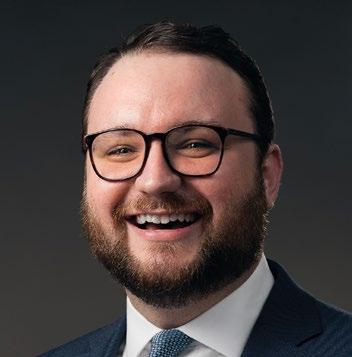












escaping liability? ‘texas two-step’ under scrutiny PAGES 4-6 June 2023 | nclawyersweekly.com VOLUME 35 NUMBER 6 IN DIGITAL. IN PRINT. IN PERSON. Expertly Focused On Today’s Legal Professional. WEEKLY 5 QUESTIONS WITH Bradley Anderton PAGE 10 FEATURE Lawyer-engineer builds successful career PAGE 8
LM PORTAL
New and improved ways to manage your policy and easily get the documents you need.

• Pay your bill online
• Download a Declaration Page
• Get confirmation of insurance



• Make policy changes
• Add attorneys and remove attorneys
LM APP


















Now available on your smartphone
• All the conveniences of the portal - on the go!
• Manage your account and make changes to your policy in a convenient app format






















• Download the app on your iPhone or Android device – Lawyers Mutual NC in the app store

• Get CLE hours on your time, and wherever you want
• FREE for Insured attorneys and paralegals/staff
• Choose the topics relevant to your practice
LIABILITY INSURANCE COMPANY OF NORTH CAROLINA LAWYER S MU TUAL 919.677.8900 800.662.8843 www.lawyersmutualnc.com NEW INSURED BENEFITS. ADDED VALUE .
ON DEMAND CLE
Get CLE when and where you want!
Visit WWW.LAWYERSMUTUALNC.COM to learn more and start using your new insured benefits.
IN PRINT. IN DIGITAL. IN PERSON. Expertly Focused On Today’s Legal Professional. 130 North McDowell Street, Unit B, Charlotte, NC 28204 (704) 377-6221 • FAX(704) 377-4258
E-mail: service@bridgetowermedia.com • Circulation: 1-877-615-9536
CONTENTS
COVER STORY : p4 | Spinoff companies a two-step or sidestep?
COURTS : p12 | Firm’s search warrant fight not covered by insurance
OPINIONS : p16 | A roundup of North Carolina court decisions
n ACCOUNTING & ADMINISTRATIVE
Business Manager
Kelly Olson kolson@bridgetowermedia.com
n ART & PRODUCTION
Creative Director
Melanie Bingham
Project Management
POWER LIST : p23 | Healthcare
VERDICTS & SETTLEMENTS : p30 | The latest results on North Carolina legal action
LAWYERS IN THE NEWS : p31 | New associations, promotions, honors

NEWS LETTER FROM THE EDITOR
n ADVERTISING
Advertising Account Executive
Sheila Batie-Jones sbatie-jones@nclawyersweekly.com
NCLAWYERSWEEKLY
North Carolina Lawyers Weekly [ISSN10411747] [USPS 002-904] is published Monthly with General Statewide Circulation by North Carolina Lawyers Weekly, 130 North McDowell Street, Unit B, Charlotte, NC 28204
Periodicals postage paid at Charlotte, North Carolina 28228-9998.
POSTMASTER - Electronic Service
Requested. Send address changes to: North Carolina Lawyers Weekly,
Jordan Mazuranic
Production Specialist
John Reno Director of Production Services
Bradley Redmond
Subscription Services, P.O. Box 1051, Williamsport, PA, 17703-9940
To place orders, temporarily stop service, change your
Hello. My name is Ross Chandler, and I am honored to have been named editor of South Carolina Lawyers Weekly. I hope that this introduction will be the first step you and I take together on a long, fruitful journey.
My goal on this “trip” is simple: Provide you with the most up-to-date information from and about the South Carolina legal community. I want you to have at your fingertips the latest reports from our writers, columnists and other sources. The work you do today at your practice might depend on the details of a late-breaking legal development, and I want you to rest assured that South Carolina Lawyers Weekly has the breadth of coverage, the specialized knowledge and the focus on the legal community to bring that information to you.
How will we get it to you? First, there is our ever-improving website, sclawyersweekly.com. Don’t have time to check the website? Check your email instead for condensed, concise daily updates from SCLW. Have the time and inclination to lean back and relax? The print version of the magazine can be read at your leisure over a cup of coffee.
My goal is to turn 30 years of experience as a reporter and editor toward producing must-read journalism and delivering it to you via the medium that serves you best.
©2023 BridgeTower Media. Material published in North Carolina Lawyers Weekly is compiled at substantial expense and is for the sole and exclusive use of purchasers and subscribers. The material may not be republished, resold, recorded, or used in any manner, in whole or in part, without the publisher’s explicit consent. Any infringement will be subject to legal redress.
BridgeTower OpCo, LLC d/b/a North Carolina Lawyers Weekly Media is an equal opportunity employer.
This will be an interesting journey, and I hope that it will be a long, happy one together.
Contact Ross Chandler at rchandler@lawyersweekly.com.
Correction: A report that appeared in the May issue titled “Jury sides with defense in total disability auto case,” did not involve total disability. Lawyers Weekly regrets the error.
NORTH CAROLINA LAWYERS WEEKLY | June 2023 3
WWW. NCLAWYERSWEEKLY.COM
address or inquire about billing: Phone: (877) 615-9536 Email: service@bridgetowermedia.com To submit subscription payments, mail: Subscription Services P.O. Box 1051
PA 17703-9940
Director/Publisher
A. Bocamazo,
rchandler@lawyersweekly.com Digital Media Manager
CIRCULATION 1-877-615-9536
Williamsport
Managing
Susan
Esq., sbocamazo@lawyersweekly.com n EDITORIAL Editor Ross Chandler
Scott Baughman sbaughman@mecktimes.com n
service@bridgetowermedia.com
Chandler
Depending on whom you ask, the pejoratively titled “Texas two-step” is either a strategic, viable defense to mass tort claims or an unfair abuse of the Bankruptcy Code.

“The term is clearly meant to be an amusing reference to country line dancing, which is popular in Texas, as well as many other Southern states,” said Durham attorney Tom Wilmoth of the Law Offices of James Scott Farrin. “However, the ramifications of this legal maneuver are anything but amusing.”

The litigation strategy got its
B y H eaTH H amacHer


name from a Texas law that defines a merger as either two companies coming together or one company dividing into two or more companies, called a divisive merger. The tactic is often used to defend claims such as those arising from asbestos and talc exposure, and looks something like this when a company faces tort liabilities: The company creates a spinoff entity — divisive merger — to which it assigns assets and liabilities. The spinoff can then file for bankruptcy while the primary business continues doing business as usual.
Some attorneys, like Wilmoth,
Depositphotos.com


believe this is a means of gaming the system.

“This absolves the original company of all liabilities and limits the total amount of money that can be used to settle claims,” Wilmoth said.
“For example, [Johnson & Johnson] is worth approximately $470 billion. When it created LTL, it transferred about $2 billion in assets. J&J now contends that it is not liable for any talc claim; rather, LTL is the sole responsible party. If this is true, then J&J has effectively limited its maximum payouts for these lawsuits to LTL’s net worth — $2 billion.”
4 June 2023 | NORTH CAROLINA LAWYERS WEEKLY
Boston attorney Michael Shepard NEWS COVER STORY
Spinoff companies a two-step or sidestep?
is involved in four bankruptcy cases before the U.S. District Court for the Western District of North Carolina, cases involving Bestwall (formerly part of Georgia Pacific), DBMP (Certainteed), Aldrich (Ingersoll Rand), and Murray (Trane). The LTL matter was also in Charlotte before being moved to New Jersey, where J&J is headquartered, in 2021.
Shepard told Lawyers Weekly that while the Texas two-step affects only asbestos and talc victims today, it could one day affect any number of products — pharmaceuticals and vehicles, for instance — on the market that hurt people.
“You’re essentially removing one of the great safeguards that we have in this country from corporate negligence or malfeasance, and that is the right to a jury trial, the right to hold that company accountable,” Shepard said.
Wilmoth agreed, calling it a “legal loophole” and saying that he believes lawmakers intended for the law to be an efficient way to spin off new companies and grow the economy, not to exploit the system.
“By placing these claims in Bankruptcy Court, the focus is taken off the merits of the claims,” he said. “The plaintiff is no longer entitled to have a jury of her peers decide whether she is due compensation, and if so, how much. Instead,
accountants and lawyers calculate the number of legal claims and average out the amounts needed to settle them out of a much smaller pot of money. Bankruptcy courts are designed to fairly distribute money from a failing company to its creditors. It was never designed to forcefully settle personal injury and wrongful death claims against a solvent defendant.”
Not passing the buck
Charlotte attorney Garland Cassada of Robinson Bradshaw, who is involved in the litigation, disagreed, saying that a divisive merger does not eliminate or reduce a company’s liability for asbestos claims or impair the company’s ability to pay for them. Instead, it allows the company to file a Chapter 11
case to resolve the liability while ensuring the company has the same ability to pay claims that existed before the merger. It does that, he said, by implementing an uncapped funding agreement in favor of the company assigned the liability requiring the spinoff company to pay the liability as it becomes necessary.
“Attempting to resolve asbestos litigation in a Chapter 11 case is a valid reorganizational purpose, even for a solvent company,” Cassada said. “Rather than ‘absolving’ a company of liability, a divisional merger and bankruptcy filing enables a company to consensually resolve all pending and future claims and pay them through an adequately funded settlement trust. The trusts operate through administrative procedures approved by representatives for claimants that are designed to pay valid claims fairly, equitably and promptly.”
Why Charlotte?
A decade-old ruling in In re Garlock (filed in 2010) might partially explain why companies have filed their cases in North Carolina. Garlock Sealing Technologies was a subsidiary of Enpro Industries, which is based in Charlotte. Garlock manu-
See Page 6
NORTH CAROLINA LAWYERS WEEKLY | June 2023 5
NEWS COVER STORY
“Rather than ‘absolving’ a company of liability, a divisional merger and bankruptcy filing enables a company to consensually resolve all pending and future claims and pay them through an adequately funded settlement trust.”
— Garland Cassada Charlotte attorney
“You’re essentially removing one of the great safeguards that we have in this country from corporate negligence or malfeasance, and that is the right to a jury trial, the right to hold that company accountable.”
Michael Shepard Attorney in four N.C. bankruptcy cases
COVER STORY
Continued From Page 5
factured coated asbestos gaskets, and the Garlock plaintiffs included thousands of mesothelioma victims and an undisclosed number of future victims. The District Court held that Garlock’s total liability should be reduced from more than a billion dollars to $125 million, finding that Garlock’s “legal responsibility for causing mesothelioma is relatively de minimis.”
“The Garlock case is important because it resulted in a successful plan of reorganization, permanently resolving all pending and future asbestos litigation against the company,” Cassada said. “The plan was approved by a large majority of asbestos claimants, as well as a legal representative representing the interests of future asbestos claimants. Under the plan, Garlock created and funded a $480 million trust that assumed sole responsibility for paying valid present and future asbestos claims against Garlock.”
Cassada added that Garlock was important because it led to a precedent-setting opinion estimating the extent of the company’s liability for asbestos claims based partly on findings that asbestos plaintiffs and their lawyers often failed to disclose significant information about their exposures to other companies’ asbestos products. Based on these findings, Cassada said, the court concluded that Garlock’s past settlements were not an accurate gauge of its current and future liability.
But add J. David Butler of Rogers, Patrick, Westbrook & Brickman in Aiken, South Carolina, to the list of attorneys who believe that the tactic is an abuse of the bankruptcy system by corporations not really in financial distress.
“It is a strategy employed by otherwise profitable companies to isolate liabilities and deny victims of corporate wrongdoing their day in
front of a jury,” Butler said. “It is an effort by corporate America to endrun the constitutional right to trial by jury in this country through the misuse of the bankruptcy system.”
Litigation as far as the eye can see
Cassada noted that in 2021, the bankruptcy and district courts confirmed a reorganization plan in a case involving Kaiser Gypsum Co., saying that the plan received overwhelming consent from asbestos claimants and the support of a future claimants’ representative. That plan was upheld by the 4th U.S. Circuit Court of Appeals earlier this year.
In the LTL matter, tens of thousands of lawsuits claimed that J&J’s baby powder caused ovarian cancer and mesothelioma. Talc claimants moved for the Bankruptcy Court for the District of New Jersey to dismiss LTL’s bankruptcy case, arguing that it was not made in good faith. The court denied those motions, but in January, the 3rd U.S. Circuit Court of Appeals dismissed LTL’s bankruptcy petition, finding that Chapter 11 is appropriate only for entities facing financial distress and that LTL was well-funded to “manage and defend thousands of talc-related claims” and was highly solvent to comfortably meet its liabilities as they came due.
In his ruling, District Judge Thomas Ambro, a former bankruptcy judge, wrote that good intentions, such as protecting J&J’s brand or comprehensively resolving litigation, alone do not suffice.
“What counts to access the Bankruptcy Code’s safe harbor is to meet its intended purposes,” he wrote. “Only a putative debtor in financial distress can do so. LTL was not. Thus, we dismiss its petition.”
Ambro added that some might argue “any divisional merger to excise the liability and stigma of a product gone bad contradicts the principles and purposes of the
Bankruptcy Code,” but that it is a call to be made on another day, in another case.
From Butler’s perspective, that day and case can’t come soon enough. He said that there is no reason the defense strategy cannot extend to pharmaceutical companies, automakers or any other corporate citizen “facing a reckoning over dangerous products or conduct” and looking to avoid those liabilities in court.
“If the misuse of the bankruptcy system through the Texas two-step is permissible, financially viable corporations can dodge accountability in the jury system and hide behind bankruptcy laws designed to protect those who are actually in financial distress,” he said. “The Texas two-step blunts accountability and therefore also provides a disincentive to corporations to make their products safer.”
Cassada said that if a company is not allowed to “two-step,” it would remain in Chapter 11 and be sued in state and federal courts nationwide for decades to come. This would benefit no one, he said, as litigation is expensive, time-consuming, and highly uncertain for all parties.
“Individuals with similar claims often obtain substantially different results, ranging from no recovery to wildly disparate recoveries,” Cassada said. “Future claims may receive no recovery at all. A successful bankruptcy reorganization, in contrast, establishes an asbestos trust that promptly and efficiently pays claims through administrative procedures that ensure equivalent treatment of similar claims, including future claims, thereby avoiding the expense, delay, and uncertainty of litigation in the tort system.”
Exactly how this litigation plays out is anyone’s guess, but the ongoing cases are highly contested and will likely be so for some time.
“It’s going to be a soap opera for sure,” Shepard said. ◆
6 June 2023 | NORTH CAROLINA LAWYERS WEEKLY
The iTracs® Advantage
TRUST ACCOUNT MANAGEMENT SERVICES

RISK MANAGEMENT = PEACE OF MIND
iTracs helps you manage trust-account-related risk through ongoing account reconciliation, account activity monitoring, and daily reporting. Gain the peace of mind that comes from knowing your trust account is secure.
EXPERT SUPPORT
The iTracs platform automates daily account reconciliation and includes transaction monitoring, activity alerts, built-in reporting, and Positive Pay options. Professional account managers provide valuable customer support and assistance, lead product implementation, and deliver training. Courteous, knowledgeable, and responsive, they serve as partners in analyzing and managing your trust account.
VALUE-ADDED SERVICES
iTracs services don’t stop with the software. Account clean-up, audit preparation, consulting, and other services are available.
CUSTOMIZED SOLUTIONS
We don’t believe in “one size fits all.” We listen first. Then we develop customized, innovative solutions that meet your ongoing business needs.
TOOLS
Several tools, including Positive Pay options, provide maximum visibility into your trust account activity and alert you to possible fraud in time for you to act.
CLIENT ONBOARDING
iTracs client onboarding and user training are second to none. Training plans, including Positive Pay automation training, are customized to meet your needs. Services are implemented quickly and efficiently.

COMPLIANCE, SIMPLIFIED
Fulfillment of compliance requirements are not easily outsourced – but we can help! iTracs reinforces best practices and has built-in protocols that assist you with meeting regulatory compliance requirements.
ELECTRONIC VERIFICATION OF RECONCILIATION
No need to wait until month end. With iTracs, your reconciliation status is confirmed daily from wherever you may be, including from your mobile device!
itracs@invtitle.com | 800.326.4842 | myitracs.com Leverage our expertise for
your firm.
Lawyer of the Year: Susan Jackson

Susan Jackson parlayed her engineering skills and education into a career as a patent attorney after she was named an inventor on a patent from research she conducted as a summer intewrn at a company where she worked.
As managing partner of Nelson Mullins Riley & Scarborough’s Charlotte office, she has expanded her practice to include intellectual property law, trademark and copyright law.
Jackson graduated magna cum laude from Clemson University with a Bachelor of Science degree in chemical engineering. She was the Clemson Chapter president of Tau Beta Pi, The Engineering Honor Society. She earned her law degree from Wake Forest University and was on the Wake Forest Law Review staff.
She serves on the Clemson University Board of Visitors, and she is a founding member and the first president of the Charlotte Women's Bar, a chapter of the North Carolina Association of Women Attorneys.
• Growing up: I grew up in Charlotte. Some of my best childhood memories are the times that I spent with my mother and grandmother who took me shopping and out to lunch on the weekends at SouthPark mall.
• Personal accomplishment: My biggest personal accomplishment is raising my two sons. One is in college at UNC-Chapel Hill, and the other is at Georgetown University. They are amazing young men, and I am extremely proud of the people that they have become.
• First job: My very first job was as a babysitter in the neighborhood where
I grew up. I learned how to be resourceful and entrepreneurial.
• Biggest career challenge: In order to have a successful and fulfilling career, I have had to learn to adapt over time and take the long view as the law, clients and co-workers change.
• Advice for aspiring attorneys: Know your strengths and choose an area of law you love. You will be successful because of your hard work and passion.
• Work-life balance: Have a great partner in life who is willing to work with you as a team for the betterment of both
of you — personally and professionally.
• Childhood goal: I wanted to be a schoolteacher.
• Favorite vacation spot: Hilton Head Island, S.C.
• A month off: I would take a trip to Sicily to learn more about my family roots.
• You didn’t know: For my 40th birthday, I learned how to ride a bike so I could go on a trip to France with my son. My family got our first dog, Bailey, a golden retriever, when my eldest son went off to college.
8 June 2023 | NORTH CAROLINA LAWYERS WEEKLY
Susan Jackson was named North Carolina Lawyers Weekly's "Lawyer of the Year."
◆
FEATURE
B y T eri S aylor
Work done for a college summer internship and a science-based undergraduate degree led Susan Jackson to a legal career in patent, intellectual property, trademark and copyright law. She also is the managing partner of Nelson Mullins Riley & Scarborough’s office in Charlotte.
NORTH CAROLINA CHAPTER

L. Bell Jr.
T. Boyette
R. Clare
M. Clare
James L. Conner II
Kate Deiter-Maradei
Erin D. Eveson
Paul T. Flick
Patricia L. Holland
Joseph T. Howell
J. Anderson Little
Terry M. Kilbride
Michael E. McDaniel
Robert A. Meynardie
Karen Britt Peeler
James S. Schenck IV
Reagan H. Weaver
Barbara B. Weyher
Scott M. Taylor
Marshall A. Gallop Jr.
Ralph W. Meekins
S. Kent Smith
W. Lewis Sauls
Sherman Lee Criner
William A. Blancato
Colleen Byers
Kenneth P. Carlson Jr.
Anderson Cromer
William H. Freeman Ellen R. Gelbin
NAME Hon. Sharon Barrett Sarah V. Corley Michael W. Drye Anne Duvoisin Jennifer S. Brearley Frank Laney LeAnn Nease Brown Melinda M. Evans Steve Dunn Wayne P. Huckel Jason B. James Raymond E. Owens Jr. Robert A. Beason Donald H. Beskind Joseph Chambliss Dailey J. Derr Rene Stemple Trehy Henry W. Gorham T. Alan Pittman Richard D. Conner Thomas C. Duncan William A. Eagles Lynn G. Gullick Jonathan R Harkavy Harper Heckman Robert A. Brinson Michael A. Swann Scott C. Hart Ken McCotter Jr. M. Ann Anderson Virginia G. Adams BASED IN Asheville Asheville Asheville Blowing Rock Cary Cary Chapel Hill Chapel Hill Charlotte Charlotte Charlotte Charlotte Durham Durham Durham Durham Durham Emerald Isle Fayetteville Greensboro Greensboro Greensboro Greensboro Greensboro GreensboroHigh Point Lexington New Bern New Bern Pilot Mtn. Raleigh PHONE (828) 768-5124 (828) 232-2800 (828) 298-1484 (828) 295-7469 (704) 533-5025 (919) 818-8029 (919) 968-1111 (919) 593-5167 (888) 305-3553 (704) 333-0073 (704) 227-0124 (704) 295-4509 (919) 419-9979 (919) 613-7085 (919) 414-1808 (919) 419-1265 (866) 517-0145 (919) 805-5003 (910) 486-0992 (336) 691-9222 (336) 274-7243 (336) 433-9980 (336) 686-4336 (336) 370-4200 (336) 387-5181 (336) 889-8733 (336) 249-7777 (252) 633-3131 (252) 635-1005 (336) 368-9621 (919) 838-8873 CALENDAR o o o NAME Collins
Asa
Richard
Barwick
Jacqueline
Thomas
BASED IN Raleigh Raleigh Raleigh Raleigh Raleigh Raleigh Raleigh Raleigh Raleigh Raleigh Raleigh Raleigh Raleigh Raleigh Raleigh Raleigh Raleigh Raleigh Raleigh Res. Triangle Rocky Mount Shelby
Pines Whiteville Wilmington Winston-Salem
Winston-Salem Winston-Salem Winston-Salem PHONE (919) 480-8738 (919) 755-1068 (919) 863-8729 (919) 755-9979 (919) 805 5007 (919) 313-4571 (919) 400-4087 (919) 412-2741 (919) 809-7346 (984) 232-8014 (919) 365-6000 (919) 967-6611 (919) 781-4225 (919) 610-7043 (919) 747-7373 (919) 272-7413 (919) 789-9242 (919) 828-0363 (919) 835-0900 (919) 949-4227 (252) 937-2200 (704) 487-1234 (910) 693-3411 (910) 642-6559 (910) 251-0004 (336) 793-4238 (336) 499-1977 (336) 721-6843 (336) 403-8911 (336) 722-8872 (336) 945-0214 CALENDAR o o o o Visit the Academy’s free roster of over 1000 of the nation’s top litigator-rated neutrals at www.NADN.org Visited by over 1200 unique legal staff monthly, NCMediators.org assisted firms in the scheduling of over 4000 mediations in 2022, for free. Available Dates Calendars Online for the State’s Most Experienced Neutrals
Southern
Winston-Salem Winston-Salem
5
QUESTIONS WITH... Bradley
Anderton
Charlotte attorney Bradley Anderton was recently featured in a magazine article in which he discussed the issue of judges misunderstanding social media and technology and how that misunderstanding relates to sexual assault cases. According to the article, judges, often because of a generational gap, are unskillful regarding the intricacies of social media communication.
Anderton, of the Law Offices of James Scott Farrin, recently spoke with Lawyers Weekly about this issue, citing a case that he was part of as an assistant district attorney.

Anderton left the district attorney’s office in 2022 and signed on with James Scott Farrin, changing careers after deciding that he wanted to “stand up for the little guy instead of prosecuting him.” He practices in the areas of car accidents and personal injury and is a member of Assistance League Charlotte, where he volunteers as an attorney coordinator and attorney trainer in the Mecklenburg County Teen Court program. He also serves as a member of the North Carolina Advocates for Justice, working with the auto torts and premises liability section.
Anderton graduated from North Carolina State University with a
bachelor’s degree in economics before earning his law degree from the University of North Carolina School of Law in 2021.
OnlyFans, the website discussed in the interview, has been around since 2016 and is a social media platform that can be used by anyone, including writers, artists, cooks and fitness trainers, to post material. It is widely known, however, for being used by sex workers who post images and videos of themselves and interact with their fans via private messages. Content is made available for a monthly fee and onetime tips.
Q. You spoke in a recent news article about a woman who claimed that a man had assaulted her after she rejected his advances. The woman lost the case. Tell me about that.
A. The first thing to understand about the case is the context of the system. At the time, I was an assistant DA in criminal district court. I represented the interests of the state, the community and justice. A lot of the time, that means advocating for victims, but not always. In this case, I was certainly trying to help the victim get closure.
Because of the nature of their online sex work, the victim did not
feel comfortable calling the police about the incident and instead took out a self-initiated criminal summons on the defendant. That system sometimes gives people confusion; here in North Carolina (and a number of other states), people can swear out charges on others by simply going to the magistrate’s office and explaining what happened to them. Oftentimes, magistrates are a rubber stamp and issue either a summons or a warrant. At that point, the DA’s office gets involved as the case becomes an active criminal case in the District Courts. That is what happened here.
At trial, I presented the facts of the case as best I could, using the victim as a witness. Unfortunately, we lost the trial because defense counsel asked about the nature of the victim’s relationship with the defendant, which opened the door to a discussion about her work on OnlyFans. I objected, but criminal district court is not like what we see on TV. It is not a court of record — there are no audio, visual, or stenographic records — and judges operate as both the finder of fact and gatekeeper of law. In other words, once the cat is out of the bag, there is no wrangling it back in.
Here, the judge had some confu-
10 June 2023 | NORTH CAROLINA LAWYERS WEEKLY FEATURE
1
B y H eaTH H amacHer
sion about what OnlyFans was and took a recess to learn about it. Once the evidence was concluded, the judge did not find the victim credible based on her OnlyFans work, and that was enough to give the judge reasonable doubt and therefore find the defendant not guilty. At that point, the case is over. There is no way to appeal; it is dead.
I was, of course, disappointed that I could not give this woman the closure she needed. But this is a common experience in district courts. When cases come down to one person’s word against another, getting beyond a reasonable doubt is nearly impossible.
Q. What is the conflation by a judge of online sex work and consent?
A. I don’t necessarily think there was a conflation of the two in this case. I think the case turned on how the judge viewed the victim and the nature of the work she was doing. I think it was difficult for the judge in this case to determine what happened because two very different pictures were painted by each side, and sex work is inherently polarizing.
Was there a consent issue in this case? Yes. That is what started the events which lead to criminal charges against the defendant. But, of course, the defendant was found not guilty because the case became a “he said, she said” situation without enough tangible evidence to find guilt beyond a reasonable doubt.
More generally, however, I do think the intersection of sex work and consent is important to consider. People often seem to hear, “She was asking for it, because of ….” The reasons are many; her outfit, being at a bar or being a sex worker. Just because someone does sex work does not mean they shouldn’t have autonomy over their body, but I think attitudes are still very mixed on that.
Q. How do cases like this depend on a judge's awareness of online communication platforms?
A. Increasingly, cases involve social media, online communications, and new technology. The social media landscape changes so quickly that it is hard for anyone to keep up. But having literacy in social media, online communication, and emerging technology is important for lawyers and judges to effectively do our jobs.
In all cases, not just those like this one, understanding — or at least having awareness of — emerging technology and social media is crucial.
Q. How common do you think it is that these types of cases are affected by this lack of understanding?
A. I think cases all across this state, country and world are impacted by an understanding of emerging
technology and social media, or lack thereof. There are big questions to consider about what is constitutional — just think about the amount of information you can discover about a person by looking through their phone! The question becomes where the line is; unfettered access to everything gives a very complete picture of a person, but we have to balance that against privacy concerns and what is really relevant to a case.
Q. What do you see as a solution?
A. More technology literacy is needed for sure, and perhaps we can address that through CLE requirements. We also need to take a serious look at the rules of evidence as they relate to technology and social media as well as creating some new constitutional doctrine to reflect the realities of our current time. ◆
REGISTER FOR BUILDING TRIAL SKILLS: NORTH CAROLINA


July 11 – 15, 2023

Dubois Center at UNC Charlotte Center City 320 E 9th St, Charlotte, NC 28202
When you participate in a NITA trial skills course you not only develop your trial skills, but improve virtually every aspect of the many things you do as a litigator.
Learn more or register at https://info.nita.org/nctrial2023
NORTH CAROLINA LAWYERS WEEKLY | June 2023 11
FEATURE
2 3 5 4
NATIONAL INSTITUTE FOR TRIAL ADVOCACY
Firm’s search warrant fight not covered by insurance
Alaw firm’s expenses to fight a search warrant and defend one of its partners during a criminal investigation weren’t covered losses under the firm’s malpractice insurance policy, the 4th U.S. Circuit Court of Appeals has held.
The government seized documents from a law firm representing the target of a racketeering investigation. After prevailing in court, the firm filed a claim with its professional insurer for its defense costs, arguing that the search warrant was a request for relief under the policy.
The district court dismissed the firm’s
claim, holding that a search warrant wasn’t a request for relief that demanded compliance and therefore not a “claim” under the policy. The court was also skeptical that conflict letters regarding a firm partner were claims.
The 4th Circuit affirmed that holding.
“Contrary to Appellants’ assertion that a warrant ‘demands compliance,’ the target of a warrant is ‘not asked to say or to do anything’ in response to the warrant,”

4th U.S. Circuit Judge Stephanie D. Thacker wrote for the court. “Instead, the warrant authorizes law enforcement to carry out the search and seizure without
regard to any response by the target of the warrant.”
Thacker was joined by Senior Judge Barbara Milano Keenan and Judge J. Harvie Wilkinson III in Brown Goldstein Levy LLP v. Federal Insurance Company.
The investigation
The law firm of Brown Goldstein Levy LLP, or BGL, represented attorney Kenneth Ravenell, who was being investigated for federal racketeering. In a letter, the government informed BGL partner Joshua Treem that he was also under investigation.
12 June 2023 | NORTH CAROLINA LAWYERS WEEKLY COURTS
B y N ick H ur ST o N
Depositphotos.com
The letter advised BGL of several nonwaivable conflicts of interest that prevented Treem from continuing to represent Ravenell. The government asked BGL to promptly notify them if Treem didn’t intend to withdraw.
Rather than withdraw, Treem retained his own attorneys. Six months later, while executing a search and seizure warrant for BGL’s offices, the government seized tens of thousands of documents, including all of Treem’s emails, regardless of their relevance to Ravenell.
In another letter, the government informed BGL that the grand jury had substantial evidence linking Treem to crimes. A filter review protocol would segregate any privileged documents seized, the government asserted.
A third letter indicated a possible conflict of interest for Treem to represent a defendant in a related civil case. The client could waive the conflict, but the government wanted that waiver confirmed for the court. Again the government asked for notice of Treem’s intentions.
BGL and Treem moved for a temporary restraining order and a preliminary injunction, as well as a return of all seized property, in the District Court of Maryland.
BGL prevailed in litigation, although it claims to have incurred more than $230,000 in costs.
Insurance claim
Federal Insurance Co. provided BGL with a professional liability insurance policy. The policy’s definition of “Claim” included “a written demand or written request for monetary damages or non-monetary relief … against an Insured for a Wrongful Act[.]” (Emphases in original.)
While “loss” included “defense costs,” the policy required the existence of a claim when the losses were incurred. The term “wrongful act” pertained solely to professional services by BGL or an insured person acting on behalf of the firm.
BGL and Treem filed a claim under the policy for losses incurred in the search warrant litigation and costs to defend Treem in connection with the criminal investigation. After the insurer denied coverage, BGL sued for declaratory judg-
ment and breach of contract in the District Court of Maryland.
Chief District Judge Thomas E. Johnson dismissed the complaint, holding that the search warrant claim wasn’t covered because it didn’t fall within the policy’s definition of “Claim.” Even if it did, the judge said BGL’s costs didn’t constitute “defense costs” under the policy.
Johnson noted that “[s]earch warrants are not forms of ‘relief,’ but rather constitute judicial authorization — based upon a finding of probable cause — to conduct searches of places and things.’”
Because “‘[t]he Government did not seek to redress any diminution of its legal rights, nor did it seek remedy for any harm brought upon it by [Appellants] in its pursuit of the Search Warrant,’ the warrant application was not a demand or request for relief against the insured,” Johnson added.
Feeling skeptical that the government’s conflict letters constituted “Claims,” Johnson held that the related costs also weren’t covered under the policy.
BGL and Treem appealed.
Not ‘relief’
Thacker found that the policy’s definition of “Claim” wasn’t ambiguous. The appellants argued that the government’s warrant application expressly “‘request[s]’ relief against BGL, and the issued warrant demands compliance.”
Here, the Fourth Circuit agreed with the district court’s holding that the search warrant application wasn’t a written request for non-monetary relief.
“To be sure, the warrant application asked the court to grant law enforcement authorization to search and seize BGL’s files,” Thacker wrote. “But that authorization is not relief ‘against an Insured’ as required by the Policy.”
Per Black’s Law Dictionary, relief means “[t]he redress or benefit, esp. equitable in nature … that a party asks of a court.”
“Relief against the insured,’ then, is the redress or benefit one party seeks, via court order, from another party,” Thacker wrote. “When the Government asked the court for authorization to search and
seize BGL’s files, it was not seeking redress or a benefit from BGL. Indeed, the warrant was issued and directed to law enforcement — not to BGL.”
While it may have been adverse to BGL, the search warrant wasn’t “against an Insured.”
“That is, the target of a warrant is ‘not asked to say or to do anything’ in response to the warrant,” Thacker explained.
The 4th Circuit rejected the appellants’ argument based on cases which held that subpoenas are written demands or requests for relief.
“[A] subpoena differs from a search and seizure warrant in that it does command the recipient to comply,” the judge said.
Similarly, Thacker was unpersuaded by the argument that there “could not be a clearer example of a written demand for nonmonetary relief” than the conflict letters.
“Each of the letters at issue was sent by the Government to ‘advise’ Treem of his status and inform him of potential conflicts of interest,” the judge said.
Rather than demanding or requesting Treem’s withdrawal, the government merely requested notice of Treem’s intentions.
The 4th Circuit affirmed the dismissal of the complaint.
‘Not frivolous’
Andrew Levy, a partner with BGL, described how armed federal agents came to their Baltimore office in body armor with a battering ram to execute the search warrant.
“It was like they were invading a crackhouse,” he told Lawyers Weekly. “For that to happen to someone with as distinguished a career as Joshua Treem was really disgraceful. Fortunately, justice prevailed and Treem was acquitted.”
Describing insurance coverage law as “arcane,” Levy believed the search warrant was a written demand for nonmonetary relief because that clause wasn’t modified by the word “civil” like other parts of policy’s definition of “claim.”
“It was not a frivolous claim,” he said. ◆
NORTH CAROLINA LAWYERS WEEKLY | June 2023 13 COURTS
Feds immune in seized smokes suit
The United States has immunity in a tort suit over property that was seized for purposes of both civil forfeiture and criminal investigation, the 4th U.S. Circuit Court of Appeals held in an issue of first impression.
The federal government seized 1,560 cartons of cigarettes during a smuggling investigation, but later offered to return them after a mistrial.
The owners refused to accept the now-expired cigarettes and sued the government for their fair market value. Immunity was “re-waived” for the negligent handling of property seized for the purpose of forfeiture, they argued.
Fourth Circuit Judge Paul V. Niemeyer, however, agreed with the government’s position and joined other federal circuits to find that the re-waiver didn’t apply here.
“In circumstances where a seizure of property was effected for both the ‘purpose of forfeiture’ and the purpose of criminal investigation, courts of appeals have concluded that the United States is still immune, construing the re-waiver provision to apply only if the property was seized solely for the purpose of forfeiture,” Niemeyer wrote.
Senior Judge Henry F. Floyd and Judge A. Marvin Quattlebaum Jr. joined Niemeyer in Myers v. Mayorkas.
Seized cigarettes
Reba and David Myers own “Dollar Stretcher,” a convenience store in Winchester, Virginia. The Department of Homeland Security, or DHS, targeted Reba and the store after an informant said she was involved with smuggling cigarettes to New York to avoid high excise taxes.
During its investigation, DHS obtained a criminal warrant that authorized the seizure of “evidence of a crime … intended for use, or used in committing a crime.”
DHS also procured a civil seizure war-
rant in West Virginia, where the Myerses resided, to seize properties subject to foreclosure, specifically “[a]ll cigarette inventory” of the Dollar Stretcher. DHS executed the warrants simultaneously and seized 1,560 cartons of cigarettes.
After a mistrial, the trafficking and conspiracy charges against Reba were dismissed and the government offered to return the seized cigarettes.
Reba refused to accept them as the cigarettes’ shelf life had expired and they were worthless.
Dismissed
The Myerses sued DHS and the United States under the Federal Tort Claims Act, or FTCA, for the fair market value of the seized cigarettes, which they contend was approximately $100,000. The government moved to dismiss.
U.S. District Judge Elizabeth K. Dillon of the Western District of Virginia found that the cigarettes were “seized for the dual purpose of forfeiture and evidence,” so she applied the “sole purpose” test from Foster v. United States, a 2008 decision of the 9th U.S. Circuit Court of Appeals.
Under Foster’s sole purpose test, “the United States retains sovereign immunity unless the detained goods were seized for the sole purpose of forfeiture.”
Dillon concluded that the government was immune and dismissed the Myerses complaint. The Myerses appealed.
‘Dual purposes’
On appeal, the Myerses said the Fourth Circuit hasn’t adopted the sole purpose test and it didn’t apply to their circumstances. They said the property in Foster was initially seized for a criminal investigation purpose and the government later seized it as forfeiture.
Here, the Myerses claimed their “cigarette inventory was initially seized for the purpose of forfeiture as an innocent substitute asset, pursuant to a warrant for civil forfeiture … not for evidentiary purposes” pursuant to a criminal search warrant.
But Niemeyer pointed out that section 2680(c) of the FTCA “preserves the United States’ sovereign immunity with respect to ‘[a]ny claim arising in respect of … the detention of any goods’ [and] applies to claims ‘resulting from negligent handling or storage of detained property.’”
With the Civil Asset Forfeiture Reform Act, the judge said Congress “‘cancelled the detention of goods exception and restored the waiver of sovereign immunity — or “re-waived” sovereign immunity — with respect to
U.S. Circuit Judge Paul V. Niemeyer
14 June 2023 | NORTH CAROLINA LAWYERS WEEKLY
COURTS B y N ick H ur ST o N
“Even though the seizure of the cigarettes in this case was authorized by both a warrant issued for criminal investigative purposes and a warrant issued for civil forfeiture — dual purposes — we conclude that the United States is immune from suit.”
4th
certain forfeiture-related seizures.’”
The Meyeres argued that this “re-waiver” permitted their case. Niemeyer said the FTCA didn’t specifically address whether the United States is immune from suit when the same property is seized pursuant to two warrants issued for different purposes.

“Nonetheless, we conclude that so long as the property is seized and detained for a criminal investigative purpose, for which the United States did not waive its sovereign immunity, we are not free to override that immunity even if the property was also seized for a purpose to which immunity is waived,” he wrote.
Niemeyer agreed with Foster that “the re-waiver provision in § 2680(c)(1), which applies when property is seized for the purpose of forfeiture, can apply only when the property is seized solely for the purpose of forfeiture.”
In Foster, the court “held that ‘the
fact that the government may have had the possibility of a forfeiture in mind when it seized Plaintiff’s property’ is insufficient if ‘criminal investigation was [also] a legitimate purpose of the initial seizure,’” the judge noted.
The Foster court also reasoned that “‘the statute’s use of the definite phrase “the purpose of forfeiture,” as opposed to an indefinite phrase “a purpose of foreclosure,” suggest[ed] that the property be seized only for the purpose of forfeiture,’” Niemeyer said.
This construction of the re-waiver gave effect to congressional objectives in creating exceptions to the FTCA, the Foster court opined. The 7th U.S. Circuit Court of Appeals later followed Foster Niemeyer said this reasoning was persuasive and noted the large criminal investigation here involved several stores in Virginia, not just Reba’s.
“If suits challenging seizures of property made in furtherance of this criminal investigation were permitted, even
though the seizures were also made for purposes of forfeiture, the suits would interfere with the criminal investigation, a result that Congress specifically sought to avoid with the ‘detention of goods’ exception to its waiver of immunity,” the judge wrote.
Niemeyer rejected the Myerses’ argument that the criminal warrant authorized the seizure of cigarette packaging, tax stamps, boxes and cartons, but not the cigarettes themselves.
He was similarly unconvinced that the “only valid purpose of the seizure could have been for the cigarettes to serve as substitute assets” rather than contraband.
“Thus, even though the seizure of the cigarettes in this case was authorized by both a warrant issued for criminal investigative purposes and a warrant issued for civil forfeiture — dual purposes — we conclude that the United States is immune from suit,” Niemeyer concluded. ◆
NORTH CAROLINA LAWYERS WEEKLY | June 2023 15 COURTS
Has your client identified fraud against the government? Partner with us. ★ ★★ ★★ “Bill Nettles is extremely effective as an advocate for his clients. You will be glad you brought your qui tam case to Carolina Whistleblower Attorneys.” Bill Nettles Former U.S. Attorney who leads our formidable team. We’re led by a former U.S. attorney who helped lead the nation in whistleblower recoveries. ✓ Experience We have the resources to invest in cases and maximize value. ✓ Resources You can be as involved in the case as you want to be. ✓ Flexibility carolinawhistleblower.com • 1-866-533-6743
OPINIONS
nomination for the office is submitted to the Senate, from the date of such nomination for the period that the nomination is pending in the Senate.” Pursuant to 5 U.S.C. § 3349a(b), the 210-day period in subsection one can be extended to 300 days when the vacancy occurs at the beginning of a presidential transition.
Administrative
Social Security Disability — Acting Commissioner — Term Lengths — ALJ Appointments
As relevant to this case, the Federal Vacancies Reform Act (FVRA) allows an acting Social Security commissioner to serve (1) for a period of days or (2) while a nomination of a commissioner is pending in the Senate. The wording of 5 U.S.C. § 3346 allowed Nancy Berryhill to serve as acting commissioner twice: (1) first, under § 3346(a)(1) and § 3349a(b), for 300 days when there was a vacancy at the end of the Obama administration and (2) second, under § 3346(a)(2), when the Trump administration’s nomination for a commissioner was pending in the Senate.
We affirm the rejection of plaintiffs’ claims for social security disability benefits, made by ALJs whose appointments were ratified by Berryhill.
This appeal concerns the proper interpretation of § 3346. It reads, in relevant part, “(a) Except in the case of a vacancy caused by sickness, the person serving as an acting officer as described under section 3345 may serve in the office — (1) for no longer than 210 days beginning on the date the vacancy occurs; or (2) subject to subsection (b), once a first or second
When two statutory provisions are joined by an “or,” each provision should typically be accorded its independent and ordinary significance. The most natural interpretation of subsection (a)(2) is that it authorizes an independent period of acting service while a nomination is pending regardless of whether the nomination occurred during (or, as here, after) the subsection (a)(1) period. In line with this interpretation, (a)(2) delineates its own beginning and ending independent of (a)(1) — authorizing acting service “from the date of such nomination” until the nomination is no longer “pending in the Senate.”

Appellants’ interpretation of (a)(2) as exclusively a tolling provision subordinate to (a)(1) would deprive (a)(2) of its independent and ordinary significance and would contravene the most natural reading of the statute’s disjunctive “or.”
Moreover, the word “or” has an inclusive sense (A or B, or both) as well as an exclusive one (A or B, not both), and is generally used in the inclusive sense. When a waiter offers a patron “coffee or dessert,” an ordinary English speaker understands that he can have both coffee and dessert if he so chooses. Without compelling context to the contrary, an acting officer may serve under § 3346(a) (1), § 3346(a)(2), or both. Berryhill’s prior service under § 3346(a)(1) therefore did not preclude her from serving under § 3346(a)(2).
Affirmed.
Rush v. Kijakazi (Lawyers Weekly No. 001-048-23, 17 pp.) (Harvie Wilkinson, J.) No. 22-1797. Appealed from USDC at Statesville, Asheville and Charlotte, N.C. (Kenneth Bell & Graham Mullen, JJ.)
Mahesha Subbaraman and George Piemonte for appellants; Anna Manchester Stapleton and Joshua Salzman for appellee. 4th Circuit
Antitrust
Monopoly Maintenance & Leveraging — Hospital System — Inpatient & Outpatient Care — Surrounding Area
Plaintiffs allege that, even if hospital-system defendants obtained their Asheville-area inpatient-care monopoly legally (largely via the now-repealed Certificate of Public Advantage law), defendants illegally coerced health insurers into including anti-steering provisions in their policies in order to maintain defendants’ monopoly in the “Asheville Region Inpatient Services Market.” Plaintiffs allege that, absent these anti-steering provisions, the insurers would be able to steer patients within the service area of defendants’ Mission Hospital-Asheville to nearby competitor hospitals such as AdventHealth Hendersonville and Pardee UNC Healthcare, who could offer higher quality care at a lower cost. Given that the court has previously held such contractual restraints to be potentially anticompetitive, the court finds that plaintiffs have adequately pleaded a monopoly maintenance claim.
Defendants’ motion to dismiss is granted as to plaintiffs’ monopoly acquisition claim (as conceded by plaintiffs) and as to plaintiffs’ claims regarding outpatient services. The motion is denied as to plaintiffs’ claims of monopoly maintenance and as to monopoly leveraging of inpatient services.
In plaintiffs’ original complaint, their allegations of monopoly leveraging as to inpatient services in outlying regions were impermissibly based on Medicare data. In their amended complaint, plaintiffs’ allegations are based on four different sources of data. For each of the
16 June 2023 | NORTH CAROLINA LAWYERS WEEKLY
To view the full list of opinion digests, please visit www.nclawyersweekly.com.
counties that make up the outlying regions, plaintiffs allege that defendants possess a market share well in excess of 70 percent.
Moreover, plaintiffs have alleged that defendants were able to obtain monopolies in these counties by “requir[ing commercial health] insurers to include all of their hospitals in-network through their all-or-nothing contracting” and that defendants “prevented insurers from steering patients to competitors in the Outlying Regions through the use of anti-steering provisions.” The amended complaint further asserts that “[a]bsent these restraints, Defendants would not have monopolized these markets.”
Plaintiffs have alleged a sufficient causal nexus between defendants’ anticompetitive acts and their ability to leverage their existing Ashevillebased monopoly for inpatient services into a new monopoly for inpatient services in the outlying regions. Plaintiffs have accordingly alleged a monopoly leveraging claim as to the outlying regions inpatient services market.
Where the amended complaint lacks any allegations regarding defendants’ market share in the outlying regions’ outpatient services market, and where plaintiffs make only conclusory allegations that defendants control prices in either the Asheville or outlying regions’ outpatient services market, plaintiffs have not stated monopoly leveraging claims as to the outpatient services markets.
Motion granted in part, denied in part.
Davis v. HCS Healthcare, Inc. (Lawyers Weekly No. 020-032-23, 24 pp.) (Mark Davis, J.) Mona Lisa Wallace, John Hughes, Olivia Smith, Jamie Crooks and Rucha Desai for plaintiffs; Phillip Jackson, John Noor, David Hawisher, Sara Razi, Abram Ellis, Laurel Fresquez, John Robinson, Dana Lumsden, Anna-Bryce Hobson, Hanna Eickmeier, Kenneth Vorrasi, Jonathan Todt, Alison Agnew and Paul Saint-Antoine for defendants. 2023 NCBC 32; North Carolina Business Court
Attorneys
Motion to Dismiss — Bar Disciplinary Decision — Privity — Quantum Meruit — Unclean Hands
A law firm cannot recover funds from intellectually disabled clients after a state bar determined that a partner at the firm acted unethically in entering into a retainer contract with the clients.
We affirm the district court’s grant of the clients’ motion to dismiss.
Michael Megaro, a partner in the plaintiff-law firm, entered into a retainer agreement with two intellectually disabled brothers who had been wrongfully imprisoned by the State of North Carolina for 31 years. Sometime after guardians were appointed for the clients, they hired replacement counsel. The law firm filed this action seeking to recover fees and expenses related to work they had performed for the clients.
On a motion to dismiss, the district court could take judicial notice of a decision by the North Carolina State Bar Disciplinary Hearing Commission. Moreover, that decision has now been upheld by the North Carolina Court of Appeals.
Collateral estoppel bars the re-litigation of the claims raised here. Megaro and the North Carolina State Bar actually litigated the question of whether the retainer agreement that Megaro signed on behalf of the firm constituted an unenforceable contract. Further, the facts that led to the Commission’s decision that the retainer agreement was invalid—the clients’ limited intellectual capacity, Megaro’s knowledge of those limitations and his decision to manipulate them into signing the agreement— were material, relevant and essential to the Commission’s findings of unethical conduct by Megaro.
Since Megaro was a partner in the firm and was acting on behalf of the firm in meeting with the clients about the retainer agreement, the firm was in privity with Megaro. Consequently, the firm is equally barred from re-litigating the claims decided by the Commission.
The firm’s equitable claims for unjust enrichment and quantum meruit are barred by the doctrine of unclean hands. Regardless of any discussion about the amount of work Megaro performed, the Commission concluded that “[b]y entering into a representation agreement with his clients when he knew they did not have the capacity to understand the agreement, [Megaro] engaged in conduct involving dishonesty, fraud, deceit or misrepresentation in violation of Rule 8.4(c) and engaged in conduct prejudicial to the administration of justice in violation of Rule 8.4(d).” The Commission also found that Megaro charged an improper fee by claiming an irrevocable interest in the clients’ potential financial payments from a civil rights action. And the Commission determined that collecting one-third of the North Carolina statutory award for the clients’ wrongful convictions was an excessive fee in violation of the North Carolina Rules of Professional Conduct since most of the work had been done before the firm was even involved.
Thus, we affirm the dismissal of the firm’s equitable claims based on the doctrine of unclean hands.
Affirmed in part, dismissed in part.
Halscott Megaro P.A. v. McCollum (Lawyers Weekly No. 001-052-23, 21 pp.) (Marvin Quattlebaum, J.) No. 22-1505. Appealed from USDC at Raleigh, N.C. (Terrence Boyle, J.) Jaime Torre Halscott for appellant; Matthew Higgins, Elliot Abrams, Liz Lockwood, Cathereine Stetson, Desmond Hogan, David Maxwell and Eric Roytman for appellees. 4th Circuit
Criminal Practice
DWI — Sentencing — Aggravating Factors — Court Determination — Reversible Error
In 2006, the General Assembly amended G.S. § 20-197(a) to take the determination of aggravating factors out of the hands of the trial judge and place that determination in the hands of the jury.
See Page 18
NORTH CAROLINA LAWYERS WEEKLY | June 2023 17
OPINIONS
OPINIONS
Thereafter, in State v. Geisslererain , 233 N.C. App. 186, 756 S.E.2d 92 (2014), we held that the trial court committed reversible error by determining, itself, that an aggravating factor existed, rather than submitting the aggravating factor to the jury for determination. When the trial court itself determined the aggravating factors in this driving while impaired case, it committed reversible error.
We remand for resentencing.
After he appealed his district court conviction, defendant was improperly left in jail, suffered a concussion, and experienced memory loss. However, defendant did not testify at his first trial, did not say he had planned to testify at his superior court trial, and did not articulate what his testimony would have been. Defendant has not shown a flagrant constitutional violation which resulted in irreparable prejudice to the preparation of his case, such that the drastic measure of dismissal was the only possible relief.
As the state concedes, the trial court erred by sentencing defendant to 36 months’ probation for reckless driving without making specific findings.
Vacated and remanded in part; affirmed in part.
Dissent
(Gore, J.) I would apply harmless error review, as in State v. Blackwell , 361 N.C. 41, 638 S.E.2d 452 (2006), cert. denied, 550 U.S. 948 (2007), and State v. McQueen , 181 N.C. App. 417, 639 S.E.2d 131, writ denied, disc. review denied, appeal dismissed, 361 N.C. 365, 646 S.E.2d 535 (Mem) (2007).
In this case, the following evidence was presented: defendant’s car crossed the center line multiple times, his car crossed the fog line multiple times, his car caused oncoming vehicles to swerve to avoid collision, he stopped at a green light, he slammed on his brakes to avoid collision with a school bus, his car collided with a construction barrel and he continued to drive, his car swerved and almost hit a construction worker who was directing traffic, he slammed on his
brakes with each stop, and he drove at “erratic speeds.”
Given this evidence, it was harmless error for the trial court to make the determination itself that the especially reckless aggravating factor applied.
State v. King (Lawyers Weekly No. 011064-23, 17 pp.) (John Arrowood, J.) (Fred Gore, J., concurring in part & dissenting in part) Appealed from Buncombe County Superior Court (Karen EadyWilliams, J.) Kathryne Hathcock for the state; Caryn Strickland for defendant. North Carolina Court of Appeals
Criminal Practice
Child Abuse — Statutory Reclassification — First Impression
The state’s evidence showed a range of dates on which defendant abused his domestic partner’s daughter, “Margot.”
During that range, the General Assembly reclassified the offense of intentional child abuse inflicting serious bodily injury (ICAISBI) from a Class C felony to a Class B2 felony; the offense of intentional child abuse inflicting serious physical injury (ICAISPI) was reclassified from Class E to Class D. Since the jury’s verdicts do not tell us whether the offenses took place before or after the reclassification, we must resolve this ambiguity in favor of defendant.
We remand the judgments for resentencing without consideration of the aggravating factor found by the jury and at the lower classification levels for the offenses in file numbers 14CRS00736 and 14CRS051293. We find no error, no prejudicial error or no plain error as to defendant’s remaining arguments. We dismiss without prejudice defendant’s claim of ineffective assistance of counsel.
Both misdemeanor and felony child abuse require the state to show the defendant is a parent or other person providing care to or supervision of a child. Consequently, it was error for the trial court to base defendant’s sentences on the aggravating factor that he “took advantage of a position of trust or confidence, including a domestic relationship.”
Defendant challenges whether his repeated vicious beatings of Margot caused her “serious bodily injury.” However, the state presented evidence that, in addition to scarring, Margot suffered necrosis, the permanent loss of muscle and other tissue (holes in her bottom), months-long pain, and open sores for years. The state’s evidence sufficed to show “serious bodily injury” in the form of “serious permanent disfigurement” and “a . . . protracted condition that causes extreme pain” as described in G.S. § 14-318.4(d)(1).
Although ICAISPI is a lesser included offense of ICAISBI, the trial court did not plainly err when it failed to include ICAISPI on the ICAISBI verdict sheets. Given the state’s evidence and the trial court’s proper instruction that the jury could only find ICAISBI if it found that Margot’s scars met the definition of serious bodily injury, defendant cannot show plain error because the verdict can be properly understood by reference to the indictment, evidence and jury instructions.
Misdemeanor child abuse is a lesser included offense of ICAISPI. However, defendant cannot show plain error in the trial court’s failure to instruct the jury on misdemeanor child abuse in relation to the ICAISPI charges. The state presented evidence that Margot suffered a head injury that (1) was incurred during a beating that was so painful she “blacked out”; (2) included bleeding from an inch-long incision on the back of her head; (3) necessitated medical treatment and staples to close; and (4) caused her to miss extracurricular activities. Margot also suffered stomach wounds that caused bleeding and scarring.
The state also presented evidence that minor victim “Scott” was beaten often, including two severe beatings that left him bruised for weeks and unable to participate in physical education classes. Given the evidence of injuries to Margot and Scott, we do not believe it probable that the jury would have reached a different result had it received instruction on misdemeanor child abuse as a lesser-included offense.
Finally, the trial court did not plainly
18 June 2023 | NORTH CAROLINA LAWYERS WEEKLY
Continued From Page 17
err when it failed to instruct the jury on lawful corporal punishment for two counts of ICAISPI involving Scott. On two occasions, defendant beat Scott for a lengthy period of time, stopping only when defendant grew exhausted. Defendant cursed at Scott while he beat him, threatened to beat him if he disclosed the abuse, and actively tried to goad Scott into physical conflict by cursing, hitting and shoving him on a daily basis. Every day, defendant told Scott that he did not care if he failed school and starved, that he hated Scott, and that he wanted Scott gone. The state introduced overwhelming evidence that defendant’s acts were not within the bounds of lawful corporal punishment because he acted for the purpose of gratifying malice.
Remanded for resentencing; no error in part, no prejudicial error in part, no plain error in part, dismissed without prejudice in part.
State v. Demick (Lawyers Weekly No. 011-062-23, 36 pp.) (Allison Riggs, J.) Appealed from Haywood County Superior Court (Marvin Pope, J.) Catherine Laney for the state; Michele Goldman and Glenn Gerding for defendant. North Carolina Court of Appeals
Domestic Relations
Equitable Distribution — IRA — 2008 Consent Order — 2022 Motion for DRO — First Impression
Once the trial court signed and entered the parties’ 2008 consent order, defendant’s interest in a traditional IRA vested. On a question of first impression, we hold that the 10-year statute of limitations in G.S. § 1-47 does not apply to a party’s motion for entry of a proposed domestic relations order when the court previously has ordered the distribution of retirement benefits and the motion does not seek an award different from the original equitable distribution order.
We reverse the trial court’s decision that defendant’s motion for a domestic relations order (DRO) was barred by the statute of limitations. Remanded.
As part of an equitable distribution award, retirement accounts may be distributed “by means of a qualified domestic relations order, or as defined in section 414(p) of the Internal Revenue Code of 1986, or by domestic relations order or other appropriate order.” G.S. § 50-20.1(g). This method of distribution “appl[ies] to all vested and nonvested pension, retirement, and deferred compensation plans, programs, systems, or funds, including . . . individual retirement accounts within the definitions of Internal Revenue Code sections 408 and 408A.” § 50-20.1(h)
Section 408 of the Internal Revenue Code defines an “individual retirement account” as “a trust created or organized in the United States for the exclusive benefit of an individual or his beneficiaries” and mandates certain investment limitations. 26 U.S.C. § 408(a). It is apparent from the record that the IRA at issue here falls into this descriptive category and may therefore be distributed through a DRO as outlined in § 50-20.1(g) or by “other appropriate order.”
We note that certain employer-sponsored retirement accounts are additionally subject to the federal Employee Retirement Income Security Act of 1974 (ERISA) and require a special class of DRO, a qualified domestic relations order (QDRO), to distribute benefits to someone other than the account participant. 29 U.S.C. § 1056(d)(3)(A). However, the trial court conflated DROs and QDROs. The IRA does not need to be a qualified retirement plan under ERISA for the trial court to issue a DRO.
The statute of limitations for initiating an action “[u]pon a judgment or decree of any court of the United States, or of any state or territory thereof, from the date of its entry” is ten years. G.S. § 1-47.
On a previous appeal, in an unpublished decision, this court affirmed the trial court’s ruling that defendant’s motions for contempt and for performance of a ministerial action under N.C. R. Civ. P. 70 were time-barred “action[s] to enforce the judgment.” A motion for a DRO can also constitute an action to enforce a judgment, such as when a party in Bracey v. Murdock , 880 S.E.2d
707 (2022), sought an additional award of “all passive gains and losses” from the disputed retirement account and to compel discovery. Here however, defendant seeks only to effectuate the 2008 consent order.
Until now, our courts have yet to address whether a motion for a DRO, as here, constitutes a time-barred “action upon a judgment” where the trial court previously granted a party vested property rights in a retirement account and the party seeking the DRO is not seeking anything other than that awarded by the original order.
We are persuaded by the reasoning of Johnson v. Johnston , 212 A.3d 627 (Vt. 2019), and Dorko v. Dorko , 934 N.W.2d 644 (Mich. 2019), hold that § 1-47 does not apply to a party’s motion for entry of a proposed DRO when the court previously has ordered the distribution of retirement benefits and the motion does not seek an award different from the original equitable distribution order. We echo Dorko in holding that “[t]here is an important distinction between a post[-] judgment order that implements a term of a divorce judgment and an action to enforce that judgment.” We note that, in the above decisions, the original equitable distribution orders specified the entry of DROs as the principal means of effectuating the distribution of the retirement accounts at issue. Though the 2008 consent order here specified a “trustee to trustee transfer” as the means of effectuating the distribution, we hold that the trial court can enter a post-judgment DRO to effectuate the intended result of the 2008 consent order.
The trial court is authorized to enter a DRO as a proper mechanism for distributing a traditional IRA. The statute of limitations does not bar a request for entry of a DRO as a means of effectuating a prior order, so long as such entry does not affect the substantive rights of the parties.
Reversed and remanded.
Welch v. Welch (Lawyers Weekly No. 011-078-23, 13 pp.) (April Wood, J.)
See Page 20
NORTH CAROLINA LAWYERS WEEKLY | June 2023 19 OPINIONS
OPINIONS
Continued
From Page
Appealed from Guilford County District Court (Michelle Fletcher, J.) No brief for plaintiff; Carolyn Woodruff, Jessica Snowberger Bullock and Michael Yin for defendant. North Carolina Court of Appeals
Domestic Relations
Equitable Distribution — Military Pension — Bankruptcy Discharge
The plaintiff-husband’s military pension was marital property, and, in any event, a military pension cannot be reached by creditors in bankruptcy. Plaintiff’s bankruptcy discharge did not affect the defendant-wife’s claim for equitable distribution of the military pension.
We affirm the trial court’s equitable distribution order.
After the parties separated and filed this equitable distribution action, plaintiff filed a voluntary bankruptcy petition. Although defendant was properly served with notice of the bankruptcy, she did not respond. After plaintiff received his discharge in bankruptcy, and after defendant learned that plaintiff had retired, defendant scheduled a hearing on her equitable distribution claim to plaintiff’s military pension.
The trial court found that defendant was a co-owner of the pension, not a creditor; the pension could not be reached by a creditor; and marital property rights in a military pension are not dischargeable. The trial court divided the pension according to the calculation stipulated by the parties, but the court found that it lacked jurisdiction to divide other property.
The holdings in Perlow v. Perlow , 128 B.R. 412 (E.D.N.C. 1991), Justice v. Justice , 123 N.C. App. 733, 475 S.E.2d 225 (1996), and Hearndon v. Hearndon , 132 N.C. App. 98, 510 S.E.2d 183 (1999), stand for a general rule that the non-filing spouse’s interests in marital property are cut off by the filing of a bankruptcy petition where the non-filing spouse’s rights had not been fixed pre-petition.
However, Walston v. Walston , 190 B.R. 66 (E.D.N.C. 1995), limited this general rule
based on the nature of the property at issue. Specifically, the non-filing spouse has a “proprietary” interest in a military pension that is not a dischargeable claim. Walston is merely persuasive authority. Nevertheless, Walston is instructive and must be taken into account, particularly in view of the fact that it is a decision of a federal court interpreting federal bankruptcy law.
Unlike furniture or other personal possessions, a military pension could not be reached by a creditor in bankruptcy. Therefore, there was no reason to treat Ms. Walston as a creditor whose rights to this property were discharged by bankruptcy, since none of Mr. Walston’s secured creditors could have ever reached this property.
The holding that marital property rights in a pension are not dischargeable in bankruptcy follows a long line of cases which have reached the same conclusion.” In this case, defendant has a proprietary interest in the military pension that survives plaintiff’s bankruptcy discharge. Thus, defendant is entitled to prosecute a claim for distribution of that per se marital property.
Defendant’s remaining general claim for an equitable distribution is, as stated in open court, “gone.” Consistent with both Perlow and Walston , the trial court accurately concluded in its written order that “[n]o other assets or indebtedness remains subject to this court’s jurisdiction.”
Affirmed.
Brown v. Brown (Lawyers Weekly No. 011069-23, 15 pp.) (Fred Gore, J.) Appealed from Onslow County District Court (James Moore, J.) Jonathan McGirt for plaintiff; Tammy Brown, pro se. North Carolina Court of Appeals
Labor & Employment
Public Employees — Wrongful Termination — Statute of Limitations — First Impression
Plaintiff brings a wrongful termination claim against state actors, pursuant to 42 U.S.C. §§ 1981 and 1983. Since plaintiff’s claim arises from post-contract-formation conduct, the claim was made possible by the Civil Rights Act of 1991.
Pursuant to 28 U.S.C. § 1658, any claims arising under any act of Congress that was enacted after December 1, 1990, is subject to a four-year statute of limitations. Consequently, the district erred when it applied North Carolina’s threeyear personal injury statute of limitations in bar of plaintiff’s claim.
We affirm the uncontested dismissal of the North Carolina Department of Justice and the uncontested dismissal of the official-capacity claims against the individual defendants for money damages. But because the statute of limitations for the remaining claims is four years, we vacate the district court’s grant of the motion to dismiss the individual defendants.
Plaintiff filed this action just shy of four years after her termination.
Neither § 1981 nor § 1983 carries an explicit statute of limitations. Typically, in such cases, federal courts should select the most appropriate or analogous state statute of limitations. For § 1983 suits, that analogous cause of action is a personal-injury suit. That is apparently why the district court applied North Carolina’s three-year limitations period for personal-injury claims, under which it determined that plaintiff’s complaint was untimely.
But in 1990 Congress enacted 28 U.S.C. § 1658, which established a catchall fouryear statute of limitations for federal claims “arising under” any act of Congress that was enacted after December 1, 1990, unless the act provided its own statute of limitations. Where § 1658(a) applies, its four-year statute of limitations supersedes any analogous state-law limitations period for purposes of claims brought pursuant to federal law.
Thus, to establish whether § 1658(a)’s four-year statute of limitations applies in this case, we must determine whether the present action “ar[o]s[e] under” the 1991 amendment to § 1981. It did. In so concluding, we join the only other circuit to have directly answered this question.
20 June 2023 | NORTH CAROLINA LAWYERS WEEKLY
Jones v. R.R. Donnelley & Sons Co., 541 U.S. 369 (2004), held that a cause of 19
See Page 38
Arbitrator awards $1.6M for institutional bias at Morgan Stanley
In what plaintiff’s counsel called one of the more significant arbitration employment law awards in North Carolina, global financial services provider Morgan Stanley was ordered to pay more than $1.6 million after being found liable for sex and age discrimination against a 51-year-old, white, male plaintiff.
The ruling came after several years of arbitration and a nine-day trial.
Josh Van Kampen of Van Kampen Law in Charlotte, an attorney for plaintiff Charles Randall, said the
April 13 award included back pay, punitive damages and attorneys’ fees and costs.
Van Kampen said that the arbitrator, Terrence Lee Croft of Atlanta, made broad findings of institutional bias in favor of women at Morgan Stanley. Specifically, the company operated “a corporate culture steeped on giving women preferential treatment.” The discrimination was so overt, Van Kampen said, that it was the theme of a “smoking gun” video produced for a Morgan Stanley annual meeting.
“Claimant went big in this arbitration by challenging that Morgan Stanley operated a corporate culture that explicitly favored women and disfavored older white males, and the arbitrator agreed and issued a large punitive damage award,” Van Kampen said.
According to Croft’s findings, Morgan Stanley operated a facially discriminatory bonus plan incentivizing discrimination in favor of women, Latinos and African Americans. The company offered a
See Page

NORTH CAROLINA LAWYERS WEEKLY | June 2023 21 NEWS
22
B y H ea TH H amac H er
An arbitrator found that Morgan Stanley's bonus plan was facially discriminatory in favor of women, Latinos and African Americans.
Photo by Ajay Suresh, Wikimedia Commons
formulaic metrics-based diversity award and a supplemental diversity award tied to the level of engagement and the quality of the manager’s efforts toward these groups.
Incentives challenged
Van Kampen said that employers should pursue diversity in the workforce through hiring, but that Morgan Stanley crossed legal lines by incentivizing managers to terminate nondiverse employees to make way for diverse new hires.
“Morgan Stanley went further and added a punitive component, wherein the manager lost money for not attaining the assigned diversity metrics,” Van Kampen said. “The metrics bonus did not just incentivize hirings of diverse candidates; it also incentivized retaining diverse candidates. Where a diverse candidate was lost, it created a loss of a diverse position that needed to be filled with a diverse candidate to maintain the status quo metric. In that scenario, managers were incentivized to ‘manage out’ nondiverse employees to make way for diverse employees.
“After receiving an all-female chain of command, (my client) was managed out of the bank despite an exemplary employment record and despite having his strongest metrics in the year he was terminated. The arbitrator agreed with our contention that had Mr. Randall been female or substantially younger, he likely would not have been terminated.”
Croft found it significant that Morgan Stanley used an award to
recognize only women across wealth management.
“Males were excluded until 2018, the year claimant filed with the [Equal Employment Opportunity Commission],” Van Kampen said. “Morgan Stanley’s deliberate decision to exclude males for such an award on a companywide basis evidences a bias in favor of women and against men.”
Randall also was represented by Noel Harlow and Brian Cordova of Van Kampen Law, and Kathryn Hagerman and Michael G. Morrison II, formerly of the firm.
“Employers mandate arbitration in employment cases because they think they are more likely to win in arbitration or avoid large verdicts, and the data validate that assessment,” Van Kampen said. “Mr. Randall defied the odds big time by winning on all claims and winning big.”

Morgan Stanley’s response
The attorneys for Morgan Stanley, Carole G. Miller and Anthony DellaSala of Bressler, Amery & Ross in Birmingham, Alabama, did not respond to a request for comment. But Susan Siering, head of Morgan Stanley’s wealth management media relations team, provided Lawyers Weekly with an emailed statement.
“Morgan Stanley strongly disagrees with the decision in this matter. The Firm sees no conflict between its commitment to diversity and inclusion and the law and believes the arbitrator evaluating this employee’s claims got it wrong,” the statement read.
According to court records, Morgan Stanley petitioned a federal court to vacate the arbitration award, citing the “evident partiality” of the arbitrator. The petition states that the arbitrator, Croft, failed to disclose that he had filed fraud claims against a predecessor of Morgan Stanley, alleging a con-
spiracy and effort to defraud him and others out of millions of dollars through knowingly false projections and representations, material omissions, fraudulent concealment, breach of fiduciary duties, and other willful and wanton conduct. The defendant noted that Croft’s claims were dismissed pursuant to the statute of limitations, and that he recovered nothing.
Morgan Stanley further stated that Croft slept through critical portions of the hearing, “always during the Respondent’s witnesses.”
Van Kampen said that Morgan Stanley “unfairly attacked” Croft’s integrity and maligned him after hiring a private investigator to dig into Croft’s past to avoid accountability.
“All the investigator uncovered was a 30-year-old investor lawsuit that the arbitrator was included in along with 49 other plaintiffs, against a thrice-removed corporate predecessor to Morgan Stanley,” Van Kampen said. “Morgan Stanley could have just as easily discovered this complaint before it selected arbitrator Croft, but it only went digging after he ruled against it.”
Van Kampen added that Croft was never observed sleeping through any portion of the hearing and that Morgan Stanley never made a record at the trial of Croft sleeping through portions of the hearing, raising the issue only after it lost.
“Rather than accept the result, I think Morgan Stanley has seemingly attempted to punish the arbitrator and to deter he and other arbitrators from punishing the Morgan Stanleys of the world,” Van Kampen said. “Morgan Stanley chose the wrong arbitrator to impugn. Arbitrator Croft has over 3,500 arbitrations and mediations under his belt and has an impeccable reputation.”
22 June 2023 | NORTH CAROLINA LAWYERS WEEKLY
◆ NEWS
Continued From Page 21
Van Kampen

HEALTHCARE p o we r L I S T T H E HEALTH CARE p o we r L I S T T H E p o we r L I S T T H E To see the full Power List profiles, visit www.nclawyersweekly.com.
DAVID BATTEN PARTNER

Over the years, Dave Batten and his colleagues have defended doctors and nurses across the country, from Alaska to South Florida.
That experience gave him an opportunity to see how attorneys in other states handle cases and reinforced his belief that attorneys in North and South Carolina have superb legal skills.
A partner at the Raleigh firm of Batten McLamb Smith, Batten defends hospital systems and doctors both nationally and locally.
He found his calling early in his career when his team prevailed in a five-week trial defending a psychiatrist whose patient had committed suicide. He learned valuable lessons from that experience.
“Our client had been the director of public health under Fidel Castro before moving his family to the United States,” Batten said. “Learning how his life experiences shaped him taught me that the background and character of your clients are likely more interesting and important to a jury than the medicine or the law.”
Batten’s cases often include traumatic and life-changing injuries and illnesses. Many of his trials involve future life care plans and have resulted in awards up to $49 million.
Batten was a founding member of the Susie Sharp Inn of Court.
Early in her career, Gina Bertolini was an advocate for victims of violent crime. That experience inspired her to expand her work to have a greater impact on people’s lives. She determined that practicing law would put her on that path.
“I thought understanding how to maneuver laws and the legal system would be a good way to help others,” she said.
Bertolini received her JD from University of California Hastings College of the Law and moved to North Carolina shortly after she finished a clerkship. She joined K&L Gates to represent healthcare providers and is a partner in the firm’s RTP office.

“I quickly learned this was a wonderful way to contribute positively to the world,” she said. “What was I didn’t expect was how intellectually challenging this area is because the laws and regulations are always changing.”
Bertolini most appreciates opportunities to solve difficult problems alongside her clients, helping further the delivery of health care and the development of products and services, while navigating the thorny policy and social issues that can arise.
“In addition to my desire to contribute positively to the world, I have always loved challenges,” she said. “So I joined the practice of law and have never looked back.”
24 June 2023 | NORTH CAROLINA LAWYERS WEEKLY THE POWER LIST DAVID BATTEN 24 GINA L. BERTOLINI .............................................................. 24 MARK T. CALLOWAY 25 FORREST W. CAMPBELL JR 25 LAETITIA L. CHELTENHAM ................................................... 25 SARAH B. CROTTS 25 J. MICHAEL FIELDS 26 JOHN B. GARVER III ............................................................. 26 CARRIE A. HANGER 26 CHAD D. HANSEN ................................................................ 26 JOY HEATH .......................................................................... 27 MARCUS C. HEWITT 27 JENNIFER CSIK HUTCHENS ................................................. 27 BRANDON W. LEEBRICK 27 JOHN D. MARTIN 28 KAYLA M. MARTY ................................................................ 28 ANTONIA A. PECK 28 DAVID A. SENTER JR. 28 STEVE SHABER ................................................................... 29 MATTHEW W. WOLFE 29 JAMES C. WRENN JR. ......................................................... 29
HEALTHCARE
HEALTHCARE
GINA L. BERTOLINI PARTNER K&L GATES RESEARCH TRIANGLE PARK
BATTEN MCLAMB SMITH RALEIGH
MARK T. CALLOWAY SENIOR COUNSEL ALSTON & BIRD CHARLOTTE
A former U.S. attorney and official with the Department of Justice, Mark Calloway brings a unique perspective to his role as senior counsel in the Charlotte office of Alston & Bird.

He represents hospital systems, medical practices, drug and device manufacturers, and health insurers, navigating them through federal criminal investigations and civil False Claims Act litigation. He also represents manufacturers and executives in federal criminal antitrust investigations.
“I have always had an interest in medicine, and I enjoy quietly helping people and companies solve difficult legal problems,” he said. “Our best work is often that which no one ever hears about.”
He noted that False Claims Act enforcement by the DOJ and by state AGs will continue to increase as additional resources are devoted to enforcement.
“Whistle blower suits will also continue to increase, making it challenging for healthcare systems, practices, and companies,” he said. “Increasingly, it’s not about ‘if’ a healthcare entity will receive a Civil Investigative Demand from the DOJ but ‘when.’”
LAETITIA L. CHELTENHAM
As a nationally certified healthcare provider and accomplished health law attorney, Laetitia Cheltenham focuses her practice on advising hospitals, health systems, clinical laboratories and other healthcare providers on a broad range of strategic and operational issues.



Cheltenham is a shareholder in the Raleigh office of Hall Render and brings broad experience to her practice. Before enrolling in law school, she was a recreational therapist and a behavioral health consultant in both private and government settings. She also taught psychology and physical education at James Sprunt Community College for nearly three years.
Cheltenham received her JD from the University of North Carolina, where she received the Gressman-Pollitt Award for Outstanding Oral Advocacy.
Active in the legal profession and her community, Cheltenham is on the board of directors of the Wake Forest Youth Ballet and the N.C. Society of Health Care Attorneys.
W. CAMPBELL JR. PARTNER BROOKS PIERCE GREENSBORO

Whenever Forrest Campbell has an opportunity to use practical, down-to-earth advice to help his clients understand and navigate thorny issues, it’s a good day for the Brooks Pierce partner.
“The laws are not intuitive enough to help individuals understand that a very good business idea for an industry could result in criminal liability in the healthcare context” he said. “I enjoy helping clients understand and navigate those laws.”
Campbell received his law degree from Wake Forest University. represents healthcare providers, including physicians, hospitals, surgery centers, assisted living facilities, health care trade associations, and others, and helps them traverse the myriad federal and state laws that govern the health care industry.
A classical musician, he holds a Bachelor of Music degree from the North Carolina School of the Arts and played with the North Carolina Symphony for a year before becoming an attorney.
His daughter and son are following in his legal and musical footsteps.
“Much to my surprise, my daughter just graduated from Yale Law School and my son is a classical musician in Toronto with a budding career,” he said. “I never dreamed either of them would choose these paths.”
SARAH B. CROTTS
As a self-described “people pleaser,” Sarah Crotts enjoys celebrating successes both large and small.
“Happy colleagues and clients are in my lifeblood,” she said. “I derive just as much joy from the small wins like getting a definition changed in a contract as I do from the big wins like closing a difficult transaction.”
Crotts has over 15 years’ experience advising healthcare providers and has extensive knowledge of health care compliance issues.
A few health law classes and a summer internship in the legal department at a local hospital convinced her that representing healthcare providers was what she wanted to do.
“Every health law attorney I met did something different and fascinating, so the concept of a practice where I could develop a niche based on my own interests was a huge selling point,” she said.
After graduating from law school, Crotts says she struggled to find a job practicing healthcare law, so she turned to litigation defense for a few years, and refused to give up on her goal.
“After an abundance of persistence and networking, I was able to transition into a health law practice,” she said.
NORTH CAROLINA LAWYERS WEEKLY | June 2023 25 HEALTHCARE
FORREST
COUNSEL PARKER POE CHARLOTTE
SHAREHOLDER HALL RENDER RALEIGH
J. MICHAEL FIELDS
ATTORNEY WARD & SMITH GREENVILLE
As healthcare practices navigate an ever-increasing number of complex and fast-moving laws and regulations, Michael Fields knows his clients must keep up with the changes and strive to stay one step ahead.
“As a practitioner, it can be a challenge to keep up and to see around the corner to advise our clients about what is likely to come next,” he said.
Fields, who received his JD from UNC-Chapel Hill, joined Ward & Smith’s Greenville office in 1999, where his practice encompasses a broad range of business law matters. He added healthcare providers to his portfolio in 2004 to help bolster the firm’s thriving healthcare practice, and now leads that practice area. He also provides mediation services in bankruptcy cases.
Along the way, he’s built valuable relationships with his clients and colleagues.
“I enjoy working with the physicians, administrators, and leaders in these practices, and I admire what they do each day,” he said.
And since the COVID pandemic, Fields has also enjoyed taking to the skies.
“I'm in training to be a private pilot, and so far, I have done a couple of solo flights,” he said.
CARRIE A. HANGER PARTNER
NELSON MULLINS WINSTON-SALEM
Carrie Hanger went to law school because she wanted to make a difference. She views healthcare law as a way to touch as many people’s lives as possible.
“I get a lot of personal satisfaction from supporting clients in their critical work,” she said. “Healthcare law is dynamic and rife with opportunities to think creatively and come up with new solutions.”
Hanger views antitrust as one of the top issues facing the industry due to the Biden Administration’s robust approach to antitrust enforcement.
“The FTC and DOJ have been viewing horizontal and vertical mergers in the healthcare and biosciences space with more scrutiny than in prior years under different administrations,” she said. “The same is true for acquisitions of physician practices by health systems.”
Along with challenges come rewards, and Hanger derives those from her clients.

“The the clients I’ve worked want to do things the ‘right’ way, and it’s satisfying and a privilege to partner with them to achieve their goals,” she said.
Hanger earned her law degree from Wake Forest University, where she was executive editor of the Wake Forest Law Review.
JOHN B. GARVER III ATTORNEY ROBINSON BRADSHAW CHARLOTTE
John Garver’s enjoyment of practicing healthcare law began when he started working with providers and developed a strong connection with them.
“To have clients that are endeavoring to deliver the best care they can to people who need it and to know that as an attorney you could play your part in helping the providers on the front lines succeed, just made the work all the more meaningful,” he said.
Garver, a partner at Robinson Bradshaw in Charlotte, is a longtime leader of the firm's Health Care Practice Group, and frequently writes and speaks on health law issues. He received his law degree from Duke University and holds a Master of Laws degree from Judge Advocate General’s School.

Garver says his rewards come from working alongside his clients, their in-house attorneys, and his colleagues from the other side of legal issues to reach solutions that work for everyone.
“And always, I enjoy the support, encouragement, and pleasure I get from being part of the team at Robinson Bradshaw,” he said.
CHAD D. HANSEN PARTNER
“My practice sprang from a single client representative looking for a second opinion to help solve a complex and nuanced set of legal issues,” he said.
That relationship led to an opportunity to work first with an organization, and then an entire industry.
“I have found that excellent clients inspire excellence,” he said.
Hansen is co-leader of the firm's Healthcare Payer Practice and a member of the firm's ERISA Litigation and Class Action teams. He represents both plaintiffs and defendants in health care, ERISA, and complex commercial litigation matters in state and federal courts.


Hansen derives his greatest career rewards from the constant evolution in healthcare law and compares healthcare lawyers to professional students.
“In addition to litigation, my practice has counseling and transactional aspects which allow me to be involved in my clients’ business, not just their disputes,” he said. “This work drives deep relationships, and those are important to me.”
26 June 2023 | NORTH CAROLINA LAWYERS WEEKLY HEALTHCARE
A rewarding professional relationship inspired Chad Hansen to pursue his career in healthcare law.
KILPATRICK TOWNSEND WINSTON-SALEM
JOY HEATH PARTNER WILLIAMS
MULLEN RALEIGH
Joy Heath feels a sense of pride when she looks over a map and sees the locations of the healthcare facilities she has helped develop over the course of her career.
After receiving her law degree from the University of Florida Fredric G. Levin College of Law, she joined a firm with a busy healthcare practice and began what would become a decades-long career.
Today, as a partner in the Charlotte office of Williams Mullen, she has over 30 years of experience representing clients in the health care sector in business and regulatory matters, focusing on primarily focusing on Certificate of Need (CON), acquisitions and compliance-related matters.

“I am proud to have worked with providers to develop new facilities, add services, and offer the major medical equipment that allow patients to receive needed health care in their communities,” she said.
Heath is the mother of two adult children. Her daughter, who was once a contestant on Jeopardy, is an attorney in Washington, D.C. Her son is a master barber in Florida.
“My children inspire me with how they have lived their lives so fully and pursued their professional dreams,” she said.
JENNIFER CSIK HUTCHENS PARTNER
BRYAN CAVE LEIGHTON PAISNER CHARLOTTE
As a leader in healthcare law, Jennifer Hutchens is most excited about innovation.
“Health AI is truly transformative,” she said. “And other areas of health innovation, such as concierge medicine, digital health, and telemedicine continue to evolve and grow.”
A graduate of Duke University School of Law, Hutchens is a partner at Bryan Cave Leighton Paisner and the global leader of the firm’s healthcare practice in Charlotte. She has been fascinated with healthcare her whole life.

“From a very young age, I witnessed the miracles of medicine and the ecosystem that helped take care of my mother, who was hospitalized for much of my childhood with a life-long mental health condition,” she said. “As I developed my academic interests in college, I became interested in finding a pathway to support that same ecosystem and give back to it.”
As a strategic, operations, and compliance-focused lawyer, she has been able to attain trusted status adviser with her clients.
“That level of partnership with my clients, including the journey to build that relationship, is a gift I do not take for granted,” she said. “It also means I routinely feel I learn more from my clients than they will ever know.”
MARCUS C. HEWITT PARTNER

Marc Hewitt is committed to helping healthcare providers solve thorny disputes and legal issues that get in the way of their mission to treat patients and promote healthy communities.
A partner at Fox Rothschild in Raleigh, Hewitt started his career as a general commercial litigator but gravitated toward health law as he gained experience.
“Healthcare disputes present a unique challenge because they involve the intersection of state and federal laws and regulations with the operational challenges faced by healthcare providers,” he said. “To be an effective litigator in this field, you need to understand the industry as well as the law.”
Hewitt chairs the North Carolina Bar Association’s Health Law Section and serves on the SearStone Continuing Care Retirement Community’s board of directors. He is a past president of the North Carolina Association of Health Care Attorneys.
A lifelong North Carolinian, Hewitt says he joined the Marines to see the world and ended up stationed at Camp LeJeune, N.C. “Now I wouldn’t live anywhere else," he said.
BRANDON W. LEEBRICK
As a principal with Ott Cone & Redpath, Brandon Leebrick focuses on hospitals, helping them with legal and operational issues involving reimbursements.

“Healthcare has always intrigued me as an impactful way to serve people, yet I never pictured myself working as a medical professional,” he said. “A health law class piqued my interest in pairing my legal skills and business knowledge with my interest in healthcare.”
In Leebrick’s view, one of the most pressing industry issues in the healthcare sector right now is medical personnel shortages and their impact on the delivery of care, particularly in an aging population.
“Changes to laws and regulations are needed to make it easier for people to access medical care and providers to get reimbursed adequately,” he said.
Working to help his client hospitals solve this and other problems keeps Leebrick passionate about his work.
“I like to help solve challenging problems, and with healthcare’s regulatory landscape always changing, there is never a dull moment,” he said.
NORTH CAROLINA LAWYERS WEEKLY | June 2023 27 HEALTHCARE
PRINCIPAL OTT CONE & REDPATH GREENSBORO
ROTHSCHILD RALEIGH
FOX
John Martin draws his inspiration from the wondrous variety that medicine brings. As managing partner at Cranfill Sumner’s Wilmington office, he co-chairs the firm’s Medical Malpractice Group, defending hospitals, physicians and physician practices and long-term care facilities that find themselves in litigation.
Martin points to rising patient expectations for fueling increasingly growing litigation.
“I think patients are more demanding now than they were years ago and are quick to make complaints to hospitals or with the NC Medical Board,” he said.
Martin, who grew up in Nigeria, received his law degree from Campbell University. He is a member of the American Board of Trial Advocates, a national association comprised of experienced trial lawyers and judges. He treasures the opportunity to work with the clients he serves in his practice.
“It is an honor and humbling to represent healthcare providers,” he said.
While growing up on a farm in Kentucky, Kayla Marty became passionate about rural access to healthcare.
“Many of my favorite clients are providers outside of metropolitan areas who provide care to those who do not have access to significant healthcare choices,” she said.
Marty, a partner at McGuireWoods in Charlotte, works extensively with fertility practices and says her greatest rewards come from helping women’s health providers expand their businesses. She is constantly amazed by the ways her clients change the lives of women and families.
“Expansion and development of my clients’ practices provides greater access to care for women across the country,” she said. “Fertility services are in high demand by families in the U.S., and access to care continues to increase as a result of the hard work of groups such as those I represent.”
When Marty has down time, she enjoys fishing, preferably on a Montana river.
DAVID A. SENTER JR
As a child, Toni Peck had her eye on a career in medicine, but a high school U.S. history class sparked an interest in law. A medical internship reinforced her resolve to become a lawyer, but it didn’t quell her interest in health care.
“My attraction to law was solidified after I completed a high school internship in medicine that made it clear seeing blood for the rest of my life was not going to work for me,” she said. “In law school, I discovered health law and it was the perfect combination of all my interests - law, medicine, business, and health policy.”
Peck is a partner in Womble Bond Dickinson’s Research Triangle Park office and a member of the firm’s healthcare team. She focuses on helping healthcare providers navigate a variety of regulatory compliance and corporate matters.


“In my practice, I get to help health systems put together ventures that bring various health care services to the public,” she said. “It’s a secretly proud moment when I drive by a facility or walk into a facility to receive health care knowing I played a small part in ensuring these services were made available to patients.”
David Senter did not start his legal career practicing healthcare law; rather, he fell into it a few years after starting his practice, when a partner on the Young Moore healthcare team needed help. Senter was an associate at the time and had worked in a variety of practice areas.

“I established an interested in healthcare privacy and security compliance and went on to establish our firm’s presence in that space,” he said.
Today, Senter is a shareholder at Young Moore. Over time, he has built valuable relationships with his clients and he treasures that aspect of his practice.

“When you work with folks for hours on end on a particular matter and then follow up with texts about someone’s son’s baseball tournament or the progress of a household project, you realize you are impacting more than someone’s 9-5,” he said. “Developing and maintaining those relationships is often more rewarding than the work itself.”
A diehard NASCAR fan, Senter said he prizes his Sunday afternoons huddled around the television with his four kids “watching men drive cars in circles.”
28 June 2023 | NORTH CAROLINA LAWYERS WEEKLY HEALTHCARE
SHAREHOLDER YOUNG MOORE ATTORNEYS RALEIGH
ANTONIA A. PECK PARTNER WOMBLE BOND DICKINSON RESEARCH TRIANGLE PARK
KAYLA MCCANN MARTY PARTNER
MCGUIREWOODS CHARLOTTE
JOHN D. MARTIN PARTNER CRANFILL SUMNER WILMINGTON
STEVE SHABER PARTNER POYNER SPRUILL RALEIGH


Steve Shaber got his first taste of healthcare law as an assistant attorney general with the N.C. Department of Justice and never looked back.
“I stuck with it because patient care and the science behind it are so interesting,” he said.
At the DOJ, Shaber represented the state in federal class action lawsuits involving hundreds of millions of dollars for Medicare, mental health, and other programs of public assistance, and he successfully argued Lassiter vs. Department of Social Services in the U.S. Supreme Court, on behalf of the state as amicus curiae.
Today, Shaber is a partner at Poyner Spruill in Raleigh, where he focuses most of his work on Medicare and Medicaid fraud & abuse, provider reimbursement, false claims, hospital medical staff matters, and professional licensing board cases.
He views efforts to help practitioners meet the medical and financial challenges of modern practices as among the top issues facing healthcare law.
“The most rewarding aspect of my practice is dealing with clients as individuals,” he said. “Honestly, a client emailed me today to say they were crying with happiness about a good result.”
JAMES C. WRENN JR. ATTORNEY SMITH ANDERSON RALEIGH

Jim Wrenn started his legal career as a general practitioner in rural North Carolina. where he realized the local hospital and other healthcare providers needed an experienced attorney to represent them. He stepped in and expanded his practice area to help these organizations and the communities they serve.
“Having access to legal counsel not only benefits healthcare, but also boosts economic development in rural settings,” Wrenn said.
Wrennserves as general counsel for numerous healthcare providers, business entities, government entities and nonprofit organizations.
From Wrenn’s point of view, the consolidation of healthcare systems and the impact it has on our rural hospitals and health care providers are among the most pressing issues facing providers and consumers today.
“With the Medicaid and Medicare expansion, reimbursements will get more complicated, creating a gulf between people who rely on these health programs and those reimbursed by private insurance,” he said. “We are also facing the continuing issues of a labor shortage, inflation, and wage pressures.”
MATTHEW W. WOLFE RALEIGH MANAGING SHAREHOLDER BAKER DONELSON RALEIGH
While working on both his master’s in public policy and his law degree at Duke University, Matt Wolfe began considering ways to develop a legal practice that would make a deep impact in society. He saw health law was a perfect fit.
“Each day, I wake up with the opportunity to advise and guide health care providers through the complex and ever-evolving sea of laws and regulations and advocate for their needs and the patients they serve,” he said.
Wolfe, the managing shareholder at Baker Donelson’s Raleigh office, helps providers still reeling from the COVID-19 pandemic which exacerbated the workforce crisis and provided temporary relief from regulatory red tape.
Take your events online
“Providers are now having to largely pivot back to pre-pandemic requirements while adapting to the transformational lessons we learned during the pandemic,” he said.
Wolfe, who has also worked as an actor, a newspaper editor, a dancer and a teacher, often draws from the skills he acquired in those roles.
“Almost everything we get to do involves bigger-picture issues that will impact our clients, their employees, their patients, and the communities they serve,” he said.
Take your events online
With many of your clients and prospects working from home, now is a great time to engage them through a webinar.
Hosting a webinar is a powerful way to connect with your target audience,and with North Carolina Lawyers Weekly - you won’t have to worry about any of the logistics.
Take your events online
Whether you’re looking to move an in-person event online,or just need to generate quality sales leads,our team can help provide turnkey service from marketing to execution!
What is included in your webinar: 45-60 minute webinar
Dedicated project support
• Email marketing
• Social media
• Print ad
For more information,please contact Sheila Batie-Jones at 704.817.1350 or sbatie-jones@nclawyersweekly.com.
With many of your clients and prospects working from home, now is a great time to engage them through a webinar.
Hosting a webinar is a powerful way to connect with your target audience,and with North Carolina Lawyers Weekly - you won’t have to worry about any of the logistics.
With many of your clients and prospects working from home, now is a great time to engage them through a webinar.
Hosting a webinar is a powerful way to connect with your target audience,and with North Carolina Lawyers Weekly - you won’t have to worry about any of the logistics.
Whether you’re looking to move an in-person event online,or just need to generate quality sales leads,our team can help provide turnkey service from marketing to execution!
Whether you’re looking to move an in-person event online,or just need to generate quality sales leads,our team can help provide turnkey service from marketing to execution!
What is included in your webinar:
• 45-60 minute webinar
What is included in your webinar:
• 45-60 minute webinar
• Dedicated project support
• Dedicated project support
• Email marketing Social media
Email marketing
Social media
• Print ad
• Print ad
For more information,please contact Sheila Batie-Jones at 704.817.1350 or sbatie-jones@nclawyersweekly.com.
For more information,please contact Sheila Batie-Jones at 704.817.1350 or sbatie-jones@nclawyersweekly.com.
NORTH CAROLINA LAWYERS WEEKLY | June 2023 29
HEALTHCARE
$1.25M SETTLEMENT
Pedestrian crossing parking lot struck by tractor-trailer
Action: Motor vehicle negligence
Injuries alleged: Traumatic brain injury, left eye vision loss, fractured thumb, decreased left ear hearing
Case name: Withheld
Court/case no.: Withheld
Jury and/or judge: Settled after mediation
Name of mediator: Daniel Gaylord
Amount: $1.25 million
Special damages: $97,000 (past medical expenses); $150,000 (past lost income); future medical expenses and future lost income disputed
Most helpful expert: Steve Farlow, accident reconstructionist, Raleigh
Date: March 15, 2023
Attorney: Isaac Thorp of Thorp Law, Raleigh (for the plaintiff)
On Sept. 17, 2020, the plaintiff, a 67-year-old truck driver, was walking across a crowded parking lot when a tractor-trailer traveling through the lot turned right and struck him. The plaintiff was thrown into the air and landed on the pavement.
Although the plaintiff did not lose consciousness, he was confused at the scene and repeatedly asked EMS responders the same questions every few minutes. When asked by an EMS responder whether he had been drinking, he said he had. However, the plaintiff’s hospital bloodwork about an hour later showed he had no alcohol in his system.
The plaintiff sustained a brain bleed, lost vision and hearing on his left side, and suffered a right thumb fracture that left him with diminished grip strength. He remained in the hospital for two days before being discharged home.
The plaintiff underwent two surgeries for his thumb fracture and extensive
$21M SETTLEMENT
physical and cognitive therapy.
Issues of liability, contributory negligence, last clear chance, and damages were hotly contested. Dashcam video showed there were no physical obstacles that would have prevented the defendant or plaintiff from seeing each other. However, the defendant denied he was liable, claiming he did not see the plaintiff because he was looking in his side mirrors as he navigated the crowded parking lot.
The plaintiff did not recall the incident and could not say whether he saw the approaching truck. The video footage showed the tractor-trailer turning left before making a sharp right turn. Plaintiff’s counsel contended his client likely saw the truck and assumed it was going to turn left. The plaintiff also pleaded last clear chance.
The parties also disagreed about whether the plaintiff, who was earning $55,000 a year as a truck driver for FirstFleet, was permanently disabled. The plaintiff’s neurologist opined that because the plaintiff suffered short-term memory loss, often became confused, and was a fall risk because of the head injury, it was unlikely he could return to competitive employment. FirstFleet acknowledged that the plaintiff could not return to work as a truck driver but suggested he could get a job as a Walmart greeter.
The defendant contended the plaintiff was not permanently disabled because of the collision, noting he was still driving a car. It also had surveillance video showing the plaintiff climbing a ladder, mowing his lawn on a riding mower, and loading a refrigerator onto a trailer to take to the dump. The de -
Auto accident case settles for $21 million
Action: Motor vehicle accident
Injuries alleged: Subject to confidentiality agreement
Case name: Withheld
Court/case no.: Withheld
Jury and/or judge: Withheld
Name of mediator: Withheld
Amount: $21M
Date: 2023
fendant further noted that the plaintiff sought medical treatment for some cognitive issues a few years before the accident.
The parties also disagreed about future medical expenses. The defendant contended that, at most, the plaintiff’s future medical expenses would be less than $50,000. The plaintiff contended that if the plaintiff’s wife was not available to assist, he would need increasing levels of attendant care because he was a fall risk and suffered from moderate short-term memory loss and confusion.
The case did not settle at mediation, partially because FirstFleet insisted it be repaid the full workers’ compensation lien of $375,000. Although plaintiff’s counsel represented the plaintiff in the negligence claim, the plaintiff refused to hire a workers’ comp attorney because he was convinced that his employer would “take care of” him. FirstFleet negotiated a settlement of the workers’ comp claim directly with the plaintiff before the negligence claim mediation. FirstFleet’s director of risk management told the plaintiff that the defendant truck driver’s company would be required to repay the workers’ comp lien. N.C. Gen. Stat. § 97-10.2 explicitly states that a plaintiff is responsible for paying the lien out of any third-party settlement.
Plaintiff’s counsel requested a Superior Court judge extinguish the lien pursuant to N.C. Gen. Stat. § 90-10.2(j). The court granted the plaintiff’s motion and eliminated the lien, finding that FirstFleet, through its director of risk management, made misrepresentations to the plaintiff that he likely relied upon to his detriment. ◆
Attorney: Meredith Hinton of the Ricci Law Firm, Greenville (for the plaintiff)
Details not provided due to a confidentiality agreement. ◆
30 June 2023 | NORTH CAROLINA LAWYERS WEEKLY
&
VERDICTS
SETTLEMENTS
$2.6M SETTLEMENT
Car accident causes death, injuries
Action: Personal injury/wrongful death
Injuries alleged: Death and serious internal injuries, spinal fractures
Case name: Withheld
Court/case no.: Withheld
Jury and/or judge: Withheld
Name of mediator: Asa Bell
Amount: $2.6 million
Date: Jan. 10, 2023
Attorney: Thomas Henson Jr. of Henson Fuerst, Raleigh (for the plaintiff)
The 67-year-old plaintiff was a passenger in a car being driven by her husband, 71, on a four-lane divided highway in Smithfield. The defendant, who was driving with
$1M SETTLEMENT
her two young children in the car, turned left in front of plaintiff’s vehicle at an intersection.
Witnesses confirmed that the plaintiff’s vehicle had the green light.
The plaintiff’s husband was killed in the impact, and the plaintiff suffered internal injuries including multiple hip fractures, diaphragmatic hernia/rupture, small bowel perforation, large disruption of fascia of lower abdominal wall from overlying tissues, contusion of spleen, liver laceration and spinal fractures at multiple levels.
The plaintiff underwent multiple surgeries during her weeklong hospitalization. Due to her fitness and determination to get better, she was physically able to resume almost
all of her daily activities, with the exception of some limited heavy lifting and digestive residual side effects.
According to family, friends and witnesses, the plaintiff’s husband was an amazing father, community member and friend.
Of the total settlement amount, $1.69 million was paid towards the wrongful death claim and $910,000 was paid to the plaintiff’s bodily injury claim.
The defendant driver and her husband were present in the mediation process and repeatedly expressed obvious and heartfelt remorse. In a first for plaintiff’s counsel, the plaintiff and defendant driver hugged and shared tears at the successful conclusion of the mediation. ◆
Death in apartment fire blamed on inoperable smoke alarms
Action: Wrongful death
Injuries alleged: Death from an apartment fire
Case name: Withheld
Court/case no.: Withheld
Jury and/or judge: N/A
Name of mediator: Ron Spivey
Amount: $1 million
Most helpful expert: Ralph Hunter, property manager, Raleigh
New associations
Beth Trahos has joined Fox Rothschild in Raleigh as a partner in the real estate department. She focuses her practice on commercial real estate development, land use and government regulation, representing developers, builders, property owners and local governments.
Matthew “Matt” Orso has joined the Charlotte office of Troutman Pepper as a partner in the white-collar and government investigations practice group,
Date: May 3, 2023
Attorney: Mark Gray II of Gray Legal Group, Greensboro (for the plaintiffs)
The plaintiff, a 21-year-old man, was an occupant of an apartment in Winston-Salem, where he lived with his girlfriend and infant child.
On June 27, 2021, a fire erupted in the
apartment in the early hours of the morning.
However, due to inoperable smoke alarms, the plaintiff and the other occupants were not alerted to the fire until they were incapacitated from the toxic fumes.
The other victims were represented by another firm.
The case involved several expert witnesses, including forensic, architectural and property management experts. ◆
LAWYERS IN THE NEWS
where he will defend companies and individuals in criminal and civil white-collar enforcement actions, conduct high-stakes internal investigations and handle complex immigration matters.
Shad Spencer, former zoning administrator for Charlotte’s Planning, Design and Development Department, has joined Moore & Van Allen’s zoning, entitlement and land use team as a zoning consultant in the Charlotte office.
Robin Tatum has joined the Raleigh
office of Fox Rothschild after serving as Raleigh’s city attorney for several years. Her practice will focus on land use, zoning and municipal work.
McGuire Woods has added Richard Starling as a partner in its Charlotte office, where he will advise fund sponsors on the organization, negotiation, structuring and operation of private investment funds, as well as regulatory and internal governance issues, and institutional investors with respect to
See Page 32
NORTH CAROLINA LAWYERS WEEKLY | June 2023 31 VERDICTS & SETTLEMENTS
Continued From Page 31
those and other alternative investments.
The Raleigh office of Baker Donelson has added two new associates, Savannah E. Lavender in corporate restructuring and bankruptcy and William Maddrey in health.
Felicia M. Gardner has joined Moore & Van Allen’s employee benefits and compensation team as a member in the Charlotte office. Most recently, she served as associate general counsel at Bank of America, where she advised on benefits, compensation and litigation management.
Cranfill Sumner has added three new attorneys. In the Raleigh office, C. Andrew Dandison will focus his practice on construction, premises liability, transportation, and admiralty and maritime law, and Winston West will practice as an employment and business dispute associate. Maxwell Shafer will join the Wilmington office as an associate in the civil litigation practice group handling admiralty and construction law matters.
Promotions
Bridget Grant, a land use and zoning consultant, has been elevated by Moore & Van Allen to co-lead the zoning, entitlement and land use team, along with veteran commercial real estate member Jeff Brown. She has nearly 20 years of land planning and urban design experience in the private and public sector and has helped lead rezonings such as River District, Camp North End, Ballantyne Reimagined, and the new mixed-use development and Novant Community Hospital at Steele Creek and Interstate 485.
Jason Evans, a partner in the business litigation practice group, became office managing partner in the
Charlotte office of Troutman Pepper on May 1. In his practice, Evans helps companies in the financial services, energy and other industries when facing highstakes litigation and government investigations. He represents business clients in complex litigation and class action disputes, antitrust litigation, investigations and compliance, as well as other government enforcement and regulatory matters.
Jason Stiles, based in Wilmington, has been promoted to office services director for Cranfill Sumner. He will supervise all office services managers and assistants across the firm’s three offices and lead training for those positions; he also will work to establish standard operating procedures for office services.
Fox Rothschild elevated Brian C. Bernhardt, a taxation and wealth planning attorney in the firm’s Charlotte office, to partner.
Offit Kurman announced the promotion of two attorneys in the family law practice group in its Charlotte office. Kyle Frost was promoted to principal, and Jessica Moreau Hester was promoted to counsel.
Honors
The Mecklenburg County Bar Association presented Robinson Bradshaw attorney Adam K. Doerr with the Outstanding Individual Attorney Pro Bono Award at its annual meeting. Among his many pro bono projects, he spearheaded an effort challenging North Carolina’s distribution of COVID19 relief aid payments to parents, led a team of firm lawyers as pro bono counsel for the North Carolina Legislative Black Caucus and is part of the legal team arguing constitutional questions on behalf of the North Carolina League of Conservation Voters. Doerr co-chairs the firm’s appeals and class action practice groups.
Professional groups
Several members of Ragsdale Liggett were tapped for positions with the North Carolina Bar Association. Litigation partner Sandy Mitterling Schilder, a member of the executive committee since 2020, was elected chair of the construction law section, while Melissa Brumback, also a litigation partner, was elected as a council member of the construction law section, beginning her three-year term in July. Sarah White, a senior litigation paralegal at the firm, was elected secretary of the executive council of the paralegal division, and litigation paralegal Erica Hauge was elected for a threeyear term to the council of the paralegal division.
Angie Zimmern, McGuire Woods pro bono director and senior counsel, is a member of the defining law firm pro bono working group, a part of the Law Firm Pro Bono Challenge initiative. Challenge signatory law firms set goals to contribute at least 3% or 5% of their total billable hours to pro bono annually, uphold the principles of the challenge and develop their firms’ pro bono cultures. The working group, formed in August 2021, recently identified and recommended changes to guidance documents in four key areas: impact finance and social enterprise, global pro bono, public rights, and racial justice.
Cary B. Davis was sworn in as the president of the Mecklenburg County Bar on May 24 for a one-year term. A partner at Robinson Bradshaw in the Charlotte office, his practice focuses on the resolution of business disputes through negotiation, trial and appeal. His litigation practice includes contract disputes, sports and entertainment law, defamation and media law, business torts, real estate and commercial lease disputes, antitrust law, government and internal investigations and trademarks and copyright law. He is the firm’s sixth attorney to serve in the position.◆
32 June 2023 | NORTH CAROLINA LAWYERS WEEKLY LAWYERS IN THE NEWS
A different ode to pro bono work
“Would you be interested in helping a group of us create an appellate pro bono program for North Carolina?”
That was the pitch to me from a group of former and current appellate judges, the director of the Pro Bono Resource Center and the lead appellate counsel for another state program.
I was a young associate and had no business getting that invitation. If I brought anything to the table, it was only enthusiasm. But a couple of years later, our little ad hoc group did manage to create the state’s first appellate pro bono program, which I administered for five years.
But I could have said no. If you want to find a reason not to do pro bono work, you’ll find one. You’re busy. The hours don’t bill themselves. Things are wild at home.
You don’t have to be a disciple of Ayn Rand to wonder about the return on investment for pro bono work. Saying yes to pro bono will cost me something, so how can it benefit me?
Pro bono work could shape your career. Creating the appellate pro bono program introduced me to the state’s appellate bar. Cases that I handled myself through the program helped make me eligible to sit for the appellate specialization exam. After launching the program, I also changed firms so I could focus on appellate law. Today, appeals are basically my entire practice.
Pro bono work also can open doors. It’s given me the chance to meet and work with other appellate practitioners, state appellate judges and our appellate court clerks.
But set aside my experience, and consider how pro bono work could strengthen ties with people you know. Want to develop better ties with one of your firm’s institutional clients? Your team and their in-house counsel could devote half a day to a driver’s license restoration project. You and the client can get to know each other better, while clients benefit from your free legal help. The N.C. Pro Bono Resource Center facilitates this and many other excellent opportunities.
Can’t find the right program for you? Make your own. The appellate pro bono program works because it benefited everyone: The volunteers get oral argument experience, the litigants get representation, and the judges get good briefings on hard questions. On top of that, the administrative burden on the bench and bar is minimal. It takes some thought, but the program will work if it has good incentives.
For younger attorneys in particular, pro bono work helps develop the skills they lack. I went straight from college to law school, so my prior work experience was limited to waiting tables. I was desperate to interact with real clients and do real legal work. In law school, I signed up for several wills clinics. It’s a big jump from “How would you like your steak cooked?” to “What do you want to happen after you die?”
I don’t draft wills anymore, but I
still have hard conversations with clients. Pro bono work quickly gets you in front of clients.
My last suggestion is to be bold as you develop expertise. Here’s a final story of a pro bono endeavor with a big impact.
For over a decade, the North Carolina Court of Appeals had rejected any notion that public schools had a constitutional duty to stop bullying and abuse. But the Supreme Court had never spoken on the issue.
At last, a case came out at the Court of Appeals with a dissent, priming the issue for Supreme Court review. I hesitated to reach out and offer to offer pro bono help on the appeal. Was I too young to run such an important appeal?
After conferring with my mentor, I stilled the doubt, took the appeal and got a decade of bad precedent unanimously overturned. The case’s name gave birth to a new type of state constitutional claim — a Deminski claim. I still get calls about the case, and it has led to paid legal work.
To be sure, there are moral reasons for doing pro bono work, and it would be nice if those were reason enough for every lawyer. That said, pro bono work can, and for busy lawyers probably should, pair with professional development goals. Don’t feel bad for wondering what pro bono work can do for you. But there are many, many ways to make it work.
So, what’s holding you back?
Troy Shelton is an appellate partner at Fox, Rothschild in Raleigh. He received the N.C. Bar Association’s 2023 Younger Lawyer Pro Bono Service Award. ◆

NORTH CAROLINA LAWYERS WEEKLY | June 2023 33 COMMENTARY
B y T roy S H el T o N
Shelton
Case study: North Carolina courts provide guidance on scope, limitations of attorney-client privilege
 B y S araH a. S HeriDaN
B y S araH a. S HeriDaN
Attorneys, particularly those working as in-house counsel or as outside counsel performing an investigation, often wear multiple hats and are expected to provide legal and business advice. A North Carolina Business Court decision provides helpful guidance regarding the scope and limitations of the attorney-client privilege, particularly in the context of when communications contain intertwined legal and business advice.
'Buckley' case background
The Buckley case involved a dispute brought in the North Carolina Business Court over whether an insurance policy issued by Oxford (an insurance company) to Buckley (a law firm) covered Buckley for certain losses associated with the departure of a key revenue-generating partner (Buckley LLP v. Series 1 of Oxford Ins. Co. NC LLC, No. 19 CVS 21128, 2020 WL 6696138 (N.C. Super. Nov. 9, 2020), aff’d, 382 N.C. 55).
By way of brief factual background, Buckley learned of potential sexual harassment misconduct by one of its founding partners and hired the Latham & Watkins Law firm to investigate the allegations. The scope of Latham’s work involved legal advice and investigative services.
Rather than participate in the investigation, the founding partner who had been accused of sexual harassment retired. Following his retirement, Buckley informed Oxford of its claim under the insurance policy due to the departure of a key revenue-generating partner. At the time, Oxford did not have an official claims department. Instead, Oxford’s in-house counsel, in addition to providing legal advice, also served in a business role with the authority to approve coverage and resolve claims. After reviewing the claim, Oxford refused to pay it. Shortly after, Buckley filed suit.
Dueling motions to compel
During discovery, Oxford and Buckley reached a standstill on privilege disputes and both filed motions to compel. Buckley moved to compel communications withheld as privileged that involved Oxford’s in-house counsel, arguing that Oxford had improperly asserted privilege over all internal substantive deliberations regarding the claim. Buckley argued that (i) communications by Oxford’s in-house counsel in her role as a business adviser are not privileged; (ii) Oxford’s internal communications regarding coverage of the claim and the amount of the claim are “core” evidence, and by including Oxford’s in-house counsel on all communications and then asserting privilege, Oxford was improperly attempting to “cloak” discoverable communications with privilege by routing them through in-house counsel; and (iii) Oxford has the burden to show that the “primary purpose” of each communication with its in-house counsel was to request or give legal advice.
Conversely, Oxford moved to compel Buckley’s communications with Latham, arguing that (i) Buckley knew of the sexual misconduct allegations against the founding partner and had already hired Latham to investigate at the time Buckley applied for insurance coverage, but failed to disclose the allegations and investigation to Oxford; (ii) the primary purpose of Latham’s investigation was to conduct a factual investigation as required by Buckley’s policies, not to provide legal advice; (iii) decisions concerning the discipline and termination of employees are business decisions; and (iv) there is no valid work product protection because Buckley’s human resources policies required an investigation, and thus the investigation was not in anticipation of litigation. According to Oxford, the critical factual issue was whether Buckley “reasonably believed” at the time it sought coverage whether there
was anything that “would be likely to result in a loss” and Buckley’s initial communications with Latham would be most telling.
Business Court’s decision
Chief Judge Louis A. Bledsoe III of the North Carolina Business Court held a hearing on the motions to compel and conducted an in camera review of the disputed communications. Bledsoe attached an addendum to his decision detailing on a document-by-document basis whether the privilege applied and ruled that most documents had been improperly withheld as privileged. With respect to Oxford’s communications, the court explained that while certain communications involving Oxford’s in-house counsel reflect the primary purpose of giving and receiving legal advice, most reflect that Oxford’s in-house counsel was acting primarily in her business role of reviewing Buckley’s claim in the ordinary course of Oxford’s business. As such, the court concluded that all such ordinary course of business communications were not protected by the attorney-client privilege.
Similarly, the court determined that many of Buckley’s communications with Latham were solely or primarily in furtherance of Latham’s factual investigation into the alleged misconduct in accordance with Buckley’s firm policies and were unrelated to the rendition of legal services. As such, the court concluded that most of Buckley’s communications with Latham were not privileged. Further, the court determined that the work product protection did not apply because none of the communications mention potential litigation, there was no evidence that Buckley feared or contemplated litigation, and Latham’s investigation would
34 June 2023 | NORTH CAROLINA LAWYERS WEEKLY COMMENTARY
Sheridan
have proceeded in the same way because it was required under Buckley’s policies.
Appeal to state Supreme Court
Buckley submitted an interlocutory appeal to the North Carolina Supreme Court. Oxford did not cross-appeal. Buckley argued that if the Business Court decision is upheld, it risks exposing highly confidential information that is revealed during investigations. Furthermore, Buckley warned that companies might be inclined to get rid of policies requiring the investigation of harassment or other misconduct for fear that any such investigation would be deemed the “regular course” of business and lose attorney-client privilege protections. Buckley also contended that the Business Court decision erodes long-standing attorney-client privileges and will “dampen” the willingness of clients to share information with counsel.
Supreme Court affirms
In August 2022, the North Carolina Supreme Court issued a three-page per curiam decision affirming the Business Court’s decision (Buckley, LLP v. Series 1 of




Oxford Ins. Co., NC, LLC, 382 N.C. 55 (2022)). The North Carolina Supreme Court reasoned that “in today’s business world, investigations of alleged violations of company policy, including sexual harassment or discrimination, are ordinary business activities and, accordingly, the communications made in such investigations are not necessarily ‘made in the course of giving or seeking legal advice for a proper purpose.’” (quoting In re Miller, 357 N.C. 316, 335 (2003)).

Lessons learned
Notably, the Business Court and Supreme Court’s decisions rest upon a long line of legal precedents in North Carolina and do not create new law. Nevertheless, many attorneys and clients will likely be surprised that the scope of the attorney-client privilege and work product doctrine can be so narrowly applied. Below are some key takeaways:

• Companies who hire outside counsel to conduct investigations as required by company policy should be aware that not all communications with attorneys
will be privileged. Attorneys should advise their clients that the fact-finding portion of an investigation is unlikely to be privileged.
• Attorneys might consider conducting investigations in two separate phases — the fact-finding phase followed by the legal analysis/advice phase — to create more clarity regarding which types of communications are covered by the attorney-client privilege.
• Companies with in-house counsel who perform legal and business functions should be mindful that copying in-house counsel on a communication does not cloak that communication with the attorney-client privilege.

• Litigators making privilege determinations and drafting privilege logs should be aware that under North Carolina law, the “primary purpose” of the communication will determine whether such communication is privileged.
Sarah A. Sheridan is a litigation associate at Moore & Van Allen in Charlotte. Her practice includes commercial disputes, arbitration and mediation.
We are always grateful for referrals and value our co-counsel relationships. Call John Alan Jones or Forest Horne to discuss a possible relationship at (800) 662-1234. All inquiries held in the strictest confidence.

NORTH CAROLINA LAWYERS WEEKLY | June 2023 35
COMMENTARY
◆
Helping People Is What We Do. MartinandJones.com 800.662.1234 Serious Personal Injury Workers’ Compensation Car Accident Injuries Mesothelioma, Lung Cancer & Asbestosis Truck Accident Injuries Camp Lejeune Water Contamination Medical Malpractice Vaccine Injuries Dangerous & Defective Products Burns & Electrical Injuries Serving all of North Carolina with offices in Raleigh, Durham and Wilmington. Serving Eastern NC 252.633.1930 • www.olivercheek.com Tough Times Require Trusted Lawyers • All Chapters of Bankruptcy • Alternatives to Bankruptcies • Receiverships John P. Marshall COMMERCIAL & CONSTRUCTION LITIGATION 106 S. McLewean Street P.O. Box 3169 Kinston, NC 28502-3169 252.527.8000 x245 Fax: 252.527.8128 jmarshall@whiteandallen.com Serving Eastern NC 252.633.1930 • www.olivercheek.com Tough Times Require Trusted Lawyers • All Chapters of Bankruptcy • Alternatives to Bankruptcies • Receiverships LAWYER TO LAWYER / Directory
A roadmap to attracting, developing and retaining great associates
Our industry has seen concerning associate attrition over the past few years, highlighting associate retention as a significant market pressure on firms going forward.
Law firms are struggling to attract and retain dedicated, motivated, reliable associates who are truly ready for practice. Adding to the frustration of many firm leaders: increased compensation and bonuses are ineffective in solving the associate retention puzzle.
Meanwhile, our industry is experiencing time management, worklife balance, and mental health crises. Associates are barely able to keep up with client work and billable-hour expectations. They have no remaining time for the building blocks of a successful practice life, including time to rest and refresh, collaborate fully with others, participate in business development, fuel their professional growth through intentional self-development, and explore their leadership potential.
Today’s associates do not learn the skills or receive the crucial support necessary to build an effective, efficient, focused, fulfilling approach to practice. Law schools do not teach those skills, and it’s challenging for law firms to provide effective associate support, given pressures on partner time, not to mention lack of insight and teaching experience at most firms.
New lawyers are not developing into the experienced lawyers and practice leaders capable of fueling not only their own success, but the success of their firms and clients.
Instead, associates are overwhelmed, burning out, and walking away, all because they do not receive the right skills and support at the right time.
Firms that solve this problem by investing in associate support are well-positioned to succeed, not only in associate retention but in other key goals.
First, when law firms invest in or build effective training and support for their associates, they are better able to attract, develop and retain top associate talent, and their associates grow into fulfilled, valuable, industry-leading lawyers.
In addition, supporting associates starts a potential cascade of wins for law firms, because investing in such support is strongly connected to a firm’s effectiveness in reducing attorney burnout; increasing attorney well-being; increasing the firm’s diversity, equity and inclusion efforts by retaining and advancing women and other marginalized lawyers; and boosting the firm’s innovation in practice by retaining and advancing innovative lawyers who tend to look for supportive law firm environments.
Law firms can unlock these wins by building or investing in support for their associates in the following three areas:
Time management training
Foundational time management skills are crucial for associates to
thrive in modern practice. Unfortunately, today’s early-career lawyers do not learn these skills and as a result are unprepared for the pressures and complex moving parts of law practice. Even top law students struggle in practice for lack of an effective time management strategy.
Simply put, we are facing a time management crisis in our profession, and it is lurking behind the many frustrations shared with me by law firm partners and other legal supervisors, as well as by associates themselves.
Without these skills, associates are unable to keep up with their work, meet deadlines, or predict and communicate how long matters will take to complete. Instead, they turn in projects at the last minute, leaving little time for others to review their work, and they constantly scramble to get work done yet still struggle to keep up. They do not have time to rest, consider their own development, participate in marketing efforts, or contribute to their own growth as leaders in the practice.
Lawyers need to understand how to use an effective time management strategy to support their priorities, i.e., what is most important, what they value, where they want to steer their life and career. When lawyers do not learn to identify and focus on their priorities as a starting point, time management skills will only expedite overwhelm and burnout, rather than help avoid those issues.
Feedback management training
Early-career lawyers need not

36 June 2023 | NORTH CAROLINA LAWYERS WEEKLY COMMENTARY
B y k a T e a H er N
Ahern
only mentoring (ideally by experienced mentors outside of the firm to avoid internal relationship limitations) but training in feedback management.
Rather than pushing feedback out at associates, firms can invest in feedback management training for their associates, empowering associates to manage their own self-development.
In doing so, firms can trade awkward, forced (or, let’s face it, often nonexistent/entirely lacking) partner-initiated feedback conversations for targeted, clear, focused, associate-initiated feedback conversations that supercharge associate development.
New lawyers are capable of managing their own progress and better suited than partners to do so. When associates manage their own feedback, they will rightfully feel more confident and in control of their own development.
Practice-ready skills training
New lawyers I work with typically struggle to independently produce the type of counseling and work product actually valuable to clients. (Don’t worry, there’s a cure for the long, accurate-but-useless memos and the vaguely relevant, legalese-filled contracts you’re recalling with frustration right now.)
Many law firms assume training associates in practice-area-specific technical skills, documents and procedure will produce practice-ready associates. Other firms assume associates need years of practice experience before they’re able to offer effective solutions, documents and counseling that fits a client’s goals, situation and industry. Great news: neither of those assumptions is true!
Instead, the real magic happens when new lawyers are guided through a shift in thinking to quickly transform the substantive knowl-
edge and analytical ability gained in law school into practical, practice-ready lawyering.
With a simple shift in thinking, not only new lawyers but even law students I work with are able to take a minimal amount of recently learned, foundational substantive knowledge and produce effective, real-client counseling rivaling results produced by lawyers with years of practice experience.
This kind of practical skills training quickly and effectively bridges the gap from law school to practice, but sadly is rarely offered to associates.
Rethinking associate support
We easily can, and certainly should, do much better for the next generation of lawyers. Associates not only crave but desperately need practical training and support in the three areas above. Firms providing that support can produce practice-ready associates, valued counselors, and indispensable colleagues who find fulfilment in their practice.
Your firm can get started by:
• Identifying the gap between your current approach to supporting your associates and your new approach including the three areas above.
What will you need to add to, or change about, your existing program? Will you need to build a new program from scratch?
• Deciding whether your firm has the knowledge, experience and time to create trainings and support in the above areas in-house, or whether your firm will need to invest in external support.
If you invest in external support to build a training program, what is your firm’s associate support budget? Who is responsible for reaching out to get started with external support? What is your target timeline for starting your new associate training and support program?
If you build a training program on your own, which partners/administrators will play a role? Who will take the lead? Exactly what will you include and how will you structure and deliver your program? How will you measure if it’s working?
• Calculating the current cost to your firm of each associate leaving the firm.
Calculate this number as concretely as possible to get a better sense of how an investment in associate support to improve retention aligns with your firm’s finances. For example, it can cost firms as much as $500,000 to lose an associate. Firms lose money in re-training associates, in recruiting new talent, in billable hours, and in additional signing bonuses, as well as on extra human resources, partner and administrative time.
• Identifying the benefits to your firm of investing in associate training and support.
Remember, supporting associates can boost retention but also contribute to attorney well-being, diversity at your firm, and innovation in your firm’s approach to practice and business development. How might these additional benefits impact your firm, colleagues and clients?
Today’s early-career lawyers are talented in myriad ways but also fully capable of outstanding practice, valued client work, leadership in the profession, and directing their own career progress. They just need the right support to unlock the results for their clients, their firms and themselves. ◆
Kate Ahern of Unfrazzled LLC guides lawyers on time management, priorities management, burnout and the related impact of gender bias and other external pressures. She also helps law firms support associate development and retention. Ahern is a law professor, former AmLaw200 attorney and transactional lawyer. She can be contacted at kate@kateunfrazzled.com.
NORTH CAROLINA LAWYERS WEEKLY | June 2023 37 COMMENTARY
OPINIONS
Continued From Page 20
action “aris[es] under” an act of Congress enacted after December 1, 1990, if the plaintiff’s claim was “made possible” by a post-1990 enactment.
Section 1983 is merely the procedural vehicle for asserting an underlying claim. What matters for purposes of determining the applicability of § 1658(a) is the substance of the plaintiff’s claim. For an action brought to vindicate rights established under § 1981, this question turns on whether the claim concerns discrimination post-contract formation that was not actionable under the original, pre1990 statute.
Here, plaintiff brought a § 1983 action for wrongful termination in violation of § 1981. A wrongful-termination claim is based on post-contract-formation conduct. It would not have been possible for plaintiff to bring this action prior to December 1, 1990, because before that date, § 1981 was limited to discrimination in contract formation and enforcement. In 1991, Congress expanded § 1981 to include discrimination post-contract formation. Therefore, the 1991 amendment to § 1981 “made possible” this § 1983 action, and the four-year catchall statute of limitations provided by § 1658 applies. Affirmed in part, vacated in part and remanded.
Chambers v. North Carolina Department of Justice (Lawyers Weekly No. 001-050-23, 9 pp.) (James Wynn, J.) No. 22-1629. Appealed from USDC at Charlotte, N.C. (Max Cogburn, J.) Bert Joseph Miano for appellant; Tamika Lynn Henderson and Joshua Stein for appellee. 4th Circuit
Real Property
Easements — Lake Norman — ThirdParty Docks
With the intent to create a lake for use in a hydroelectric project, defendant Michael Kiser’s grandparents granted a broad easement to plaintiff’s predecessor (Duke). The easement granted Duke “absolute water rights” and the right “to treat said 280.4
acres, more or less, in any manner deemed necessary or desirable by Duke Power Company.” This broad easement gave Duke the authority to allow third-party homeowners to build structures over and into the submerged property and to use the lake in a recreational manner.
We reverse the Court of Appeals’ decision to the contrary.
Relying on Lovin v. Crisp , 36 N.C. App. 185, 243 S.E.2d 406 (1978), the Court of Appeals adopted a bright-line principle that “unless an easement explicitly states otherwise, an easement holder may not permit strangers to the easement agreement to make use of the land, other than for the use and benefit of the easement holder, without the consent of the landowner where such use would constitute additional burdens upon the servient tenement.” Therefore, according to the Court of Appeals, because the third-party homeowners here are not mentioned in the easement and did not have a property interest in the land when the easement was created, “Duke exceeded its scope of authority by permitting the [third-party homeowners] to construct and maintain structures over and into the Kisers’ submerged land without the Kisers’ consent.”
Lovin , however, is readily distinguishable from the facts here, is not binding on this court, and establishes a principle that narrows the easement’s broad and unambiguous language.
In Lovin , a landowner conveyed an easement by deed to his neighbor. The language of the easement permitted the easement holder “to install and maintain a water line” on a specific tract of land. Because the easement’s language was narrowly confined to benefit one parcel of land and the surrounding property was not described in the easement, the court held that the easement holder could not install additional water lines to benefit neighboring lands.
Here, however, unlike the limited easement in Lovin confining the use of the easement to a specific tract of land for a narrow purpose, the language of the easement is broad and does not constrain how Duke may treat the easement property. There is a vast difference between intend-
ing to create and maintain a lake versus allowing a water line to cross a property.
As such, under the broad language of the easement here, Duke may permit third parties to use the easement property when such use is necessary or desirable to Duke.
Therefore, because the easement in Lovin and the easement here serve different purposes and contain material differences, the Court of Appeals erred by relying on Lovin and applying a novel principle that contradicts and narrows the clear language of the easement at issue.
The easement’s unambiguous language granting Duke broad authority over the submerged property is consistent with the purpose of Duke’s federal licensing obligations over Lake Norman and allows Duke to comply with its Federal Energy Regulatory Commission license requirements.
Moreover, Duke’s broad grant of authority has been confirmed by the parties’ practice over the past 60 years, during which third-party homeowners have applied to Duke – not the Kisers – for permission to build docks and related structures. In fact, the Kisers themselves sought and received permission from Duke to build shoreline structures extending from their lot and into the submerged property.
The plain language of the easement is unambiguous and grants Duke broad authority to treat the submerged easement property in any manner Duke deems necessary or desirable. Therefore, Duke acted within the scope of its broad authority under the easement by allowing the third-party homeowners to build docks, piers, and other structures over and into the submerged land without the Kisers’ consent.
Duke Energy Carolinas, LLC v. Kiser (Lawyers Weekly No. 010-015-23, 16 pp.) (Paul Newby, C.J.) Appealed from Catawba County Superior Court (Nathaniel Poovey, J.) Kiran Mehta, Christopher Browning and Victoria Alvarez for plaintiff; Ty Kimmer McTier and David Redding for defendants; David Parker, Mark Childers and Kevin Donaldson for third-party defendants. North Carolina Supreme Court
38 June 2023 | NORTH CAROLINA LAWYERS WEEKLY
At Liberty University School of Law, we provide unparalleled skills training to produce practice-ready graduates who will become lawyers of distinction. We promote a culture that cultivates both integrity and high ethical standards to ensure our graduates are ready to lead in their communities.
in their communities.
At Liberty University School of Law, we provide unparalleled skills training to produce practice-ready graduates who will become lawyers of distinction. We promote a culture that cultivates both integrity and high ethical standards to ensure our graduates are ready to lead in their communities.
Three consecutive years of high bar passage rate for first-time takers:
Three consecutive years of high bar passage rate for first-time takers:
At Liberty University School of Law, we provide unparalleled skills training to produce practice-ready graduates who will become lawyers of distinction. We promote a culture that cultivates both integrity and high ethical standards to ensure our graduates are ready to lead in their communities.

Three consecutive years of high bar passage rate for first-time takers:
Three consecutive years of high bar passage rate for first-time takers:
2020)
NORTH CAROLINA LAWYERS WEEKLY | June 2023 39 92% (2019) INSPIRE THE PROFESSION. INNOVATE THE PRACTICE. IMPACT THE WORLD.
Law,
Three
for first-time takers: 95% (2018) 92% ( July-Oct. 2020) 92% (2019) � LawCareer@liberty.edu � (434) 592-6068 � Liberty.edu/Law /LibertyUniversityLaw
At Liberty University School of
we provide unparalleled skills training to produce practice-ready graduates who will become lawyers of distinction. We promote a culture that cultivates both integrity and high ethical standards to ensure our graduates are ready to lead in their communities.
consecutive years of high bar passage rate
95% (2018) 92% ( July-Oct. 2020) 92% (2019) IMPACT THE WORLD. � LawCareer@liberty.edu � (434) 592-6068 � Liberty.edu/Law /LibertyUniversityLaw
At Liberty University School of Law, we provide unparalleled skills training to produce practice-ready graduates who will become lawyers of distinction. We promote a culture that cultivates both integrity and high ethical standards to ensure our graduates are ready to lead in their communities. Three consecutive years of high bar passage rate for first-time takers:
At Liberty University School of Law, we provide unparalleled skills training to produce practice-ready graduates who will become lawyers of distinction. We promote a culture that cultivates both integrity and high ethical standards to ensure our graduates are ready to lead
95% (2018) 92% ( July-Oct.
92% (2019) IMPACT THE WORLD. � LawCareer@liberty.edu � (434)
� Liberty.edu/Law /LibertyUniversityLaw
2020)
592-6068
95% (2018) 92% ( July-Oct.
92% (2019) INNOVATE THE PRACTICE. IMPACT THE WORLD.
LawCareer@liberty.edu
(434) 592-6068 � Liberty.edu/Law
�
�
95% (2018) 92% ( July-Oct.
92% (2019) INSPIRE THE PROFESSION. INNOVATE THE PRACTICE. IMPACT THE WORLD.
2020)
95% (2018) 92% ( July-Oct.
2020)




























































































































































































































































Take the first step today toward building equity in your brand, promoting your excellence and o ering your audience more reasons to trust you. Contact EVG, and a member of EVG’s content licensing team will be happy to answer your questions and get you started. enveritasgroup.com You’ve Earned it... EnVeritas Group: creative licensing solutions for brands that earn accolades they deserve. A now Promote it! Enveritas is the exclusive reprints and logo licensing partner for North Carolina Lawyers Weekly Reprinted with permission of North Carolina Lawyers Weekly © 2021 NCLAWYERSWEEKLY.COM ■ BY HEATH HAMACHER A Wake County jury has awarded $3.41 million to 23-year-old woman for sexual abuse she endured for nearly decade. Ian Richardson of Vann Attorneys and Daniel Barker of Barker Richardson, both in Raleigh, report that their client, Moriah Taylor, was repeatedly sexually abused by her father, David Taylor, from the time she was 8 years old until she reported the abuse to her bishop when she was 17. Her mother, Toby Taylor, knew about the abuse and did nothing to stop it, Richardson said. Ordinarily, Lawyers Weekly does not divulge the names of victims of sexual abuse. But Richardson said that his client “wanted to shine a bright light on what happened, as she felt like when she was a child this was improperly swept under the rug by numerous people, including her mother.” “I think, at least for our client, there was something powerful about facing this situation head-on,” Richardson said. Court records show that David Taylor was convicted of attempted sexual battery in 2015, and Richardson said that David admitted to sexually abusing Moriah approximately five times, though Moriah claims she was abused “more times than she can count.” The suit alleged negligence and negligent infliction of emotional distress by Toby Taylor. Richardson said that Toby admitted to knowing that when Moriah and some of her sisters (David and Toby have 11 children together, Richardson said) were younger, David would call them into his home office “to inspect their breasts.” “Toby told [Child Protective Services] that she knew something was going on, but couldn’t put her finger on it,” Richardson said. Richardson said that David served just few days in jail after pleading guilty to the offenses, time meted out only after he violated probation by contacting Moriah. “Therefore, we asked a civil jury to hold both he and Toby Taylor accountable for what happened and impose a punishment consistent with the nature of the abuse,” Richardson said. David and Toby represented themselves at trial. After a three-day trial, the jury deliberated about four hours, Richardson said, before finding them liable on Aug. 19 and awarding Moriah $1,185,800 in actual damages and $2,225,000 in punitive damages. Nevertheless, Richardson said he considers it only “halftime” in the case, since David and Toby claim that they are too poor to pay the judgment. “But we have evidence that they own cryptocurrency and substantial precious metals,” Richardson said. “So now we’re going to go focus on collecting.” Follow Heath Hamacher on Twitter @NCLWHamacher Jury awards $3.41M to woman sexually abused by father VERDICT REPORT — SEXUAL ABUSE Amount: $3,410,800 Injuries alleged: Emotional distress and post-traumatic stress disorder Case name: Moriah Taylor v. David and Toby Taylor Court: Wake County Superior Court Case No.: 18-CVS-12294 Judge: Graham Shirley Date of verdict: Aug. 19 Demand: $1 million Highest offer: $25,000 Attorneys for plaintiff: Daniel Barker of Barker Richardson and Ian Richardson of Vann Attorneys, both in Raleigh Attorneys for defendants: None Barker Richardson Reprinted with permission of North Carolina Lawyers Weekly © 2021 AMANDA M. CUBIT Sodoma Law Union Monroe O all Amanda M. Cubit’s accomplishments so far in her career, serving on the board of Turning Point, Inc. has been her most important and rewarding. Turning Point, in Union County, serves survivors of domestic violence, sexual assault and child abuse. “The mission of this organization is close to my heart as frequently represent people who have been affected by domestic violence,” she says. Cubit, family lawyer with Sonoma Law Union in Monroe, received her law degree from Charlotte School of Law in 2012 after graduating from Clemson University with Bachelor of Arts degree in political science. She started her career practicing with Legal Aid of North Carolina. She has happy memories of growing up near Philadelphia, where she enjoyed celebrating birthdays, holidays and important milestones with her parents, two younger siblings and extended family. “Family has always been the most important part of my life, and would not be who I am today without their love and support,” she says. If Cubit could have dinner with anyone of her choosing, it would be her grandfather. She had close relationship with him, but he passed away when she was young. “There are many questions would love to ask him, and stories would love to hear now that am older,” she says. During the COVID-19 lockdown, Cubit became enthralled with the show “Below Deck” on the Bravo channel. She is still hooked and rarely misses an episode. “My brother is captain of yacht, and the show gives me a look into how he spends his days,” she says. “It goes without saying that we lead very different lives.” RISING STARS 2021



























































































 B y S araH a. S HeriDaN
B y S araH a. S HeriDaN




















































































